I’ve only sporadically updated this blog in the past few years, mostly because I’ve been migrating to my teaching blog (technology and otherwise): dehlatinteach.wordpress.com. So all posts from here on out will be posted there. Please click above to follow along. Thanks for all of the support over the years.
Classical Play Project 2018 – Production Video
September 12, 2018
Assessment, Engagement, Low-Tech, PBL Leave a comment
Here it is, a bit late, but worth the wait? Maybe?
Eddy Rex: A Re-imagining of Sophocles' Oedipus Rex from WayCAM Public on Vimeo.
Classical Play Project 2018 – Closed Ended Reponses
September 12, 2018
Assessment, Engagement, Low-Tech, PBL, Statistics Leave a comment
Didn’t realize that I hadn’t posted these, so here they are.
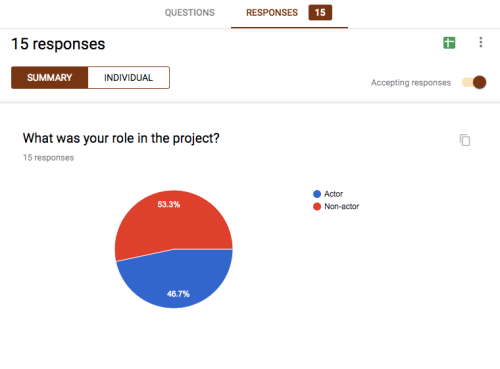
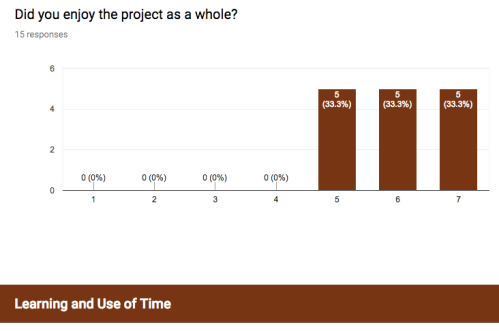
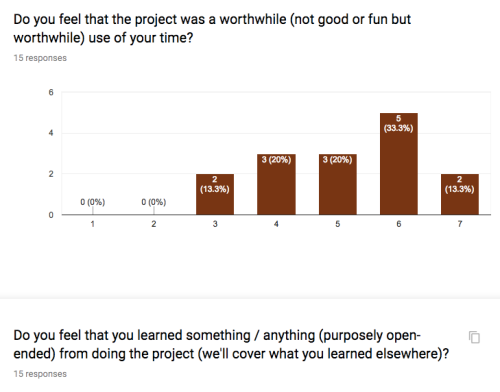
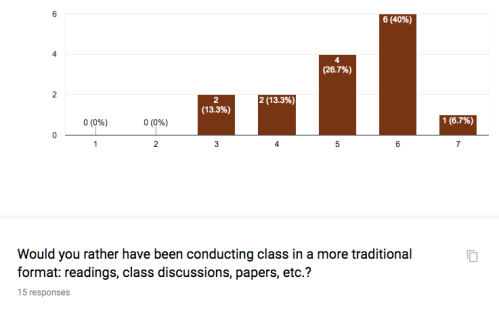
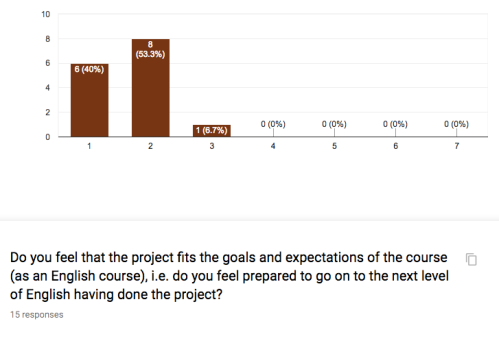
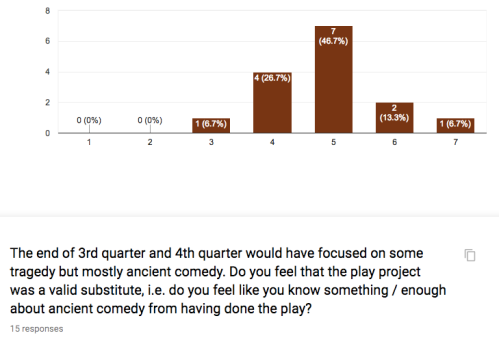
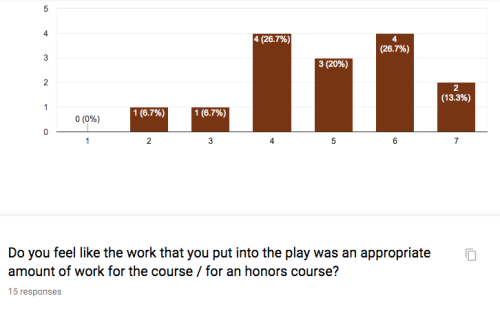
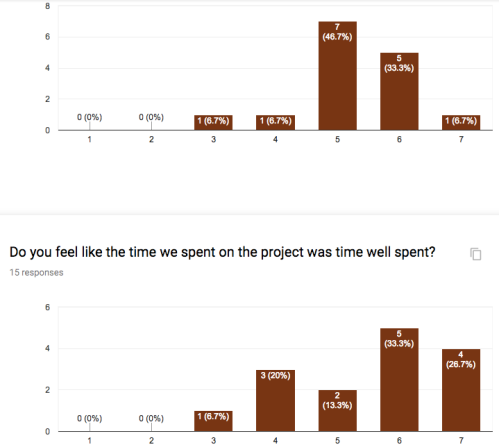
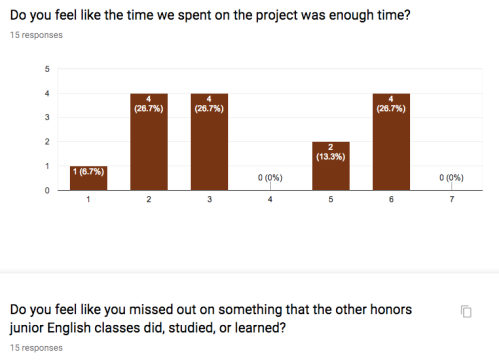
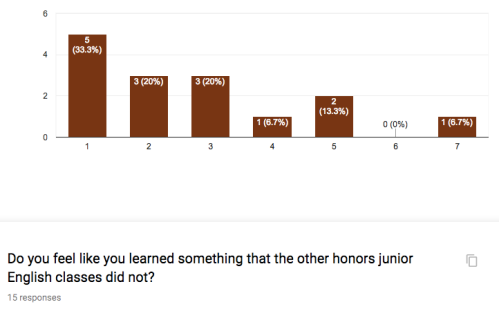
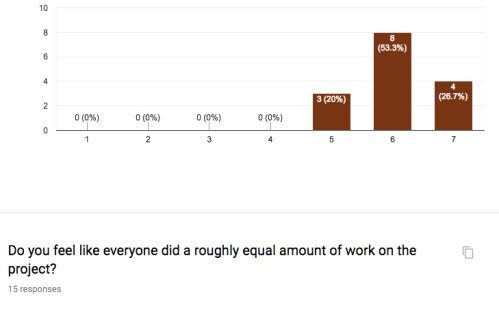
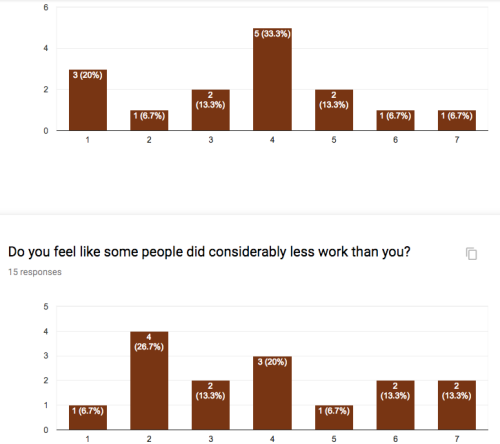
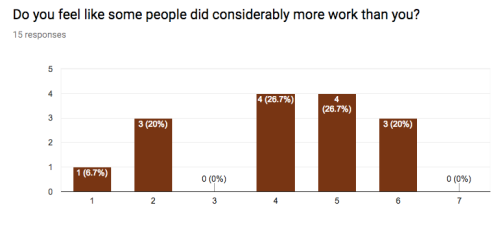
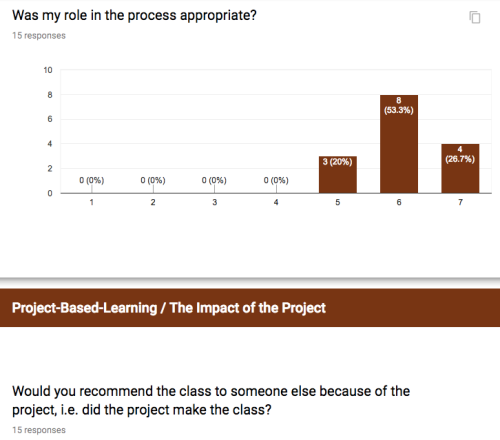
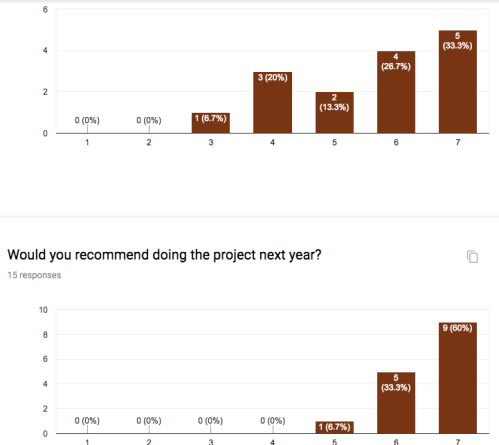
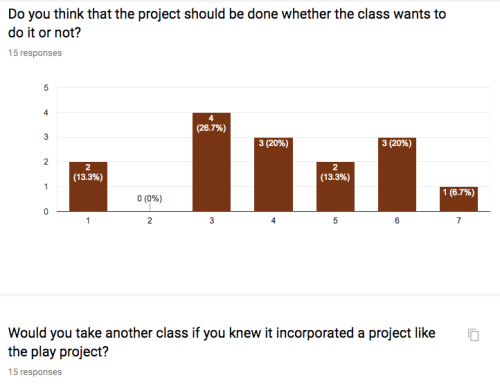
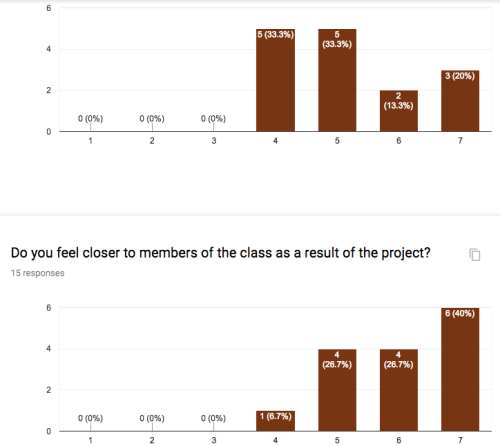
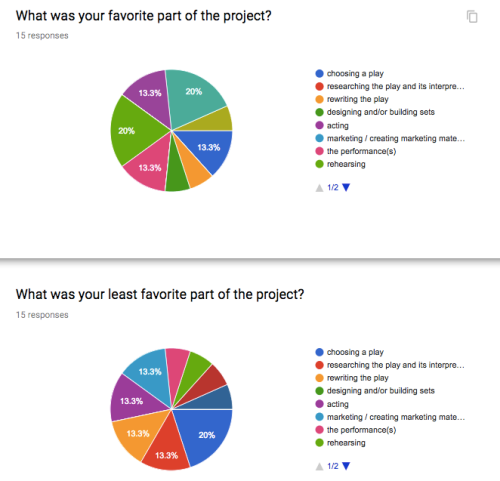
Classical Lit Play Project 2018 – Open Response Evals
June 19, 2018
Engagement, Low-Tech, Observations / Evaluations, PBL Leave a comment
Reponse #1
The play project was a success from an engagement standpoint; you all bought in more than I expected you to and, with few exceptions, remained engaged for the duration of the project. Do you feel that that engagement alone makes the project worthwhile? To put it another way, you were engaged. But what did you learn? What did you take away from the project? And is that take away enough to justify doing the project, i.e. is what you learned valuable enough / useful enough to warrant the project?
Yes, I think that we all learned a lot in many different ways and improved our knowledge in different areas: whether that be in scriptwriting, acting, set work, media, or simply teamwork and working with others to produce something great! As a whole, I think this project was worth all the time and work that we put into the production; what each of us took away from the project definitely made it a valuable experience for me. Personally, I learned a lot about others and how people can be so different— a good different!— when one sees them in a different setting. The play project brought out the best in everybody, and everyone got a chance to participate no matter what their interests. I learned a lot about the great time commitment and work it takes to put on such a presentation — even a production that lasts for 15 minutes. At the beginning of the process, I was unsure of how the project would play (pun-intended) out since our class is made up of smaller groups of very different people; however, as we approached the date of the performance, I saw the pieces fall into their places as we all worked together efficiently and effectively. Being engaged throughout the process and up until the final presentation is critical to the project’s success. The knowledge taken away from the experience was different for each one of us and was valuable.
I can’t speak for everyone, but I will readily admit that I was particularly willing to do this because I knew it would be easy for me. I was not drawn to take part out of a desire to learn, but rather a desire not to have to write more long papers or take more tests I’m not prepared for. It worked. I was not stressed about my grade at any point during this project, but that doesn’t mean I wasn’t at all bothered. It didn’t take long for me to start being annoyed by how bad this show was shaping up to be. It was fine once I reminded myself that that’s not the point. It’s about doing something other than essays and tests at the end of the year and that’s a very valuable experience. Whatever dumb idea that somehow becomes part of the show of weird uncomfortable thing I had to do, I never had to stay up late worrying about grades for english class. Please keep doing this for the sanity of any future students.
It was nice to try something different instead of writing another paper or participating in another socratic seminar. Even though we did not follow the traditional classroom route, I think the play was important. We gained experience and skills that could actually apply to real life. For example, the play took so much work. I have been a part of many concerts and dance performances, but nothing compares to a production like this. We had to write the script, modernize the plot, design props, shoot videos, and perform in front of Wayland residents. It shocked me how many classes it took to produce an 18 minute production. Another thing I will remember from this project is the collaboration aspect. Although there are some collaborative projects, most school courses do not focus on working with others. Normally it is about being the best by yourself. However, it is hardly like that in the real world. People often have to cooperate with others. This project introduced me to that, and I enjoyed getting to know people I do not normally talk to.
In terms of engagement, I agree with the judgement that we were all more committed to the play than our previous regimen of in-class discussions. Given the relatively short amount of time we had to stage the play, I believe the takeaways in teamwork outweigh any benefit of continuing normal classes. The beginning of the process, with the play presentations, was reminiscent of the Achilles in Media presentations with more of a book report feel to it. Studying a play on our own without class discussion to guide us presented a unique challenge that was unfortunately cut short due to time limitations. Still the process of analyzing a play on our own was certainly a valuable lesson. Other areas we developed through the play fall under team coordination; I think it’s fair to say most of us had little to no experience working in a group this size without significant guidance. Although your delegation of tasks through the survey proved vital to our organization, we were collectively still able to adapt to the limited time we had; we coordinated what we needed to get done, and shut out overly grandiose ideas that weren’t feasible in the time we had. Compared to what we had been doing prior to the play, the process of entangling logistics in addition to understanding and analyzing an ancient play was simply superior. The rewriting of the play required an understanding of the original that we would be hard pressed to find in a normal class environment. In summary, we not only focused on and pieced apart a play, but also had to deal with the logistics of putting on a play on top of the analysis. The play essentially traded, not sacrificed, literary analysis from class for group organization; we still had to work with literature, just not as much. This tradeoff, in my opinion, warrants the project. By Q4, we gone through enough literature that the exchange was reasonable.
During this play project, I was able to learn the story of Oedipus Rex very well, something I don’t think I will forget, and also how to work well with the people in our class. This project wasn’t high stress, and it wasn’t packed with information that we had to memorize like for a test or a project in another class. Rather, it was a project where we were able to go, work in our groups or as a class as a whole, and create a play. I don’t think that’s a bad thing though, rather, I think that’s what made the play such a success. People were able to walk into the classroom knowing that they wouldn’t have to stress out like they did in other classes, which made people more willing to work harder, and put in the effort they probably wouldn’t want to otherwise. This, I think, justifies doing the play. Because we didn’t feel a lot of pressure regarding school work while doing this, we were able to work harder, and learn more. We were able to communicate with each other well, become closer as a class, and learn how to – if you’re shy – talk more, and – if you’re louder – listen to others and encourage them to speak their minds. I think that this project is important to do every year, as not only do you learn about ancient literature, but also about life skills.
The constant engagement made the play project very worthwhile. It kept us interested and helped us to learn about classical literature in a new way. Through the modernization and the rewriting of the classical plot, we were able to understand the mechanisms behind classical writing with modern context. Since we had to remake the play, we had to understand how each idea was used in Oedipus Rex in order to recreate it. After we all read and discussed Oedipus Rex, I think we gained a greater understanding of it than with books we read earlier in the year. This play also sparked a new enthusiasm for classical literature because we could actually apply what we new about it as a team to make something entertaining.
What we took away was more than enough to warrant the project. This project diverges from the conventional english class to help students actively learn. Rather than reading boring books and writing grueling essays, we could actually enjoy exploring literature. With this divergence, we also learn new things that we wouldn’t get out of normal english class. For example, we get experience collaborating with classmates in teams to overcome obstacles. Overall, this project was a very effective use of time because we learned much more than normal and enjoyed doing it.
Doing this project, I think we all learned something more than what a typical english class would learn. The class this year was a perfect mix of skills and personality, which made the play worth doing. To an extent, not all of us ride within the same friend groups, so working with people that I normally would not talk to was a good experience. The project was engaging, and reading/writing our version was something really unique. I think the reason as to why this project fits in so well with the rest of the year is because we hammered so hard during the first three quarters. The first three quarters were full of analyzing plays and poems. To create our own version of a popular tragedy was a lot of fun and was definitely a learning experience. Just working with people that I normally would not work with to create a massive production makes the project worthwhile.
I was certainly engaged in the play from when we started all the way up to the performance. I think I took one “english learning” thing away from the play and that was the fact that there were many small pieces of the play that were scarily similar to modern-day comedic patterns. As a whole, the plot of Oedipus Rex isn’t entirely relatable to modern audiences, but it has traces throughout the play of things that seem very familiar to modern TV or movies. I think this discrepancy between the plot being so far “out there” and the small moments being so relatable was both a challenge and a blessing when trying to convert the play into a modern rendition. It took a lot of thinking to come up with a counterpart plot to the killing of Lance and the love story between Eddy and Jo, but that was part of the learning experience in trying to make something completely unrelatable, relatable. This conversion, however, was made much easier due to the fact that the play is built on dramatic irony and the fact that Eddy just isn’t smart enough to put the pieces of the prophecy together. Dramatic irony is commonly used nowadays for comedic purposes, so it was easy for us to use this technique in order to make our plot more believable. I think that this learning experience in itself is enough to justify doing the play, however, I don’t think that it was emphasized enough to really make an impact on the other students. So while it was an obvious learning theme throughout the play, the actual impact of it wasn’t apparent to everybody. I think that had we done one class either in the middle of the making of the play or closer towards the performance where Mr. D led a discussion about what we were taking away from it, that would have been very valuable in the learning experience because it would have been impactful for each individual as well as something to think about for the duration of the production.
The play project was useful in my opinion because it allowed us as a class to exhibit and witness skills in each other that may not have been associated with people throughout the year. I was surprised at how well we worked together and resolved issues, and the amount of passion that some people brought to the performance. Generally, our class was pretty segregated and quiet throughout the year, so being forced to work with different people for once in an active way was really fun and interesting. We definitely had more fun with each other than the audience did, which was fine with me and ended up making it more fun in my opinion.
I believe that the play project was worthwhile not only because it kept us engaged but also because it gave us a new experience and taught us new skills. Although we did not have to do the play project, I feel like we have already read a bunch of books and wrote a lot essays this year, so doing more of that instead of doing the play probably would not have taught us a much. Doing the play was a new experience for me and it taught me valuable skills that will be useful for the future. I learned how to write a script and how the style of writing is different from writing essays, and how to logistically organize a play and make sure we had all of the right props, costumes, etc. I also think that the play was a valuable experience because it put us in charge of all of the decision making. We chose the play we would perform, how we would adapt it to modern times, what scenes we would have, what the character would say, and basically everything else involved in putting on the play. I think by putting us in charge of the play and not just telling us what play we are doing, what our lines are, it made us more independent and able to think for ourselves. By having to make all of the decisions for ourselves, it helped us to become better leaders, but also better listeners. We learned to listen to other people’s ideas, evaluate their ideas, give them constructive feedback and improve on them. All of these are worthwhile skills and will be useful to have for the future. Instead of doing the play this quarter and we had just continued to do what we had been doing all year, then we would have missed out on the opportunity to experience something new, which is why I believe that the play was a worthwhile project.
I think to some extent engagement definitely makes the project worthwhile as most of the year there is a lot of work that I’m sure some students feel they are not as engaged in yet do because it is mandatory. Having a project that is interesting and something students want to be involved in brings the class full circle and ends the year on a high note. I think myself, and the rest of the class learned about ancient comedy, teamwork and the amount of work that goes into putting on even a miniscule production such as ours. From a teaching stand point I’m not sure if the amount learned by the students was equivalent to what we might have learned from a more traditional end-of-year curriculum, but as a student I am definitely in favor of the play project. For juniors I think that the entire year has been particularly rigorous and to end this class with something lighter than say, a paper, relieved stress and added a fun twist to an already lovable class. On top of that, I do think that the teamwork aspect of this play is much different than the other type of team building exercises experienced in other classes, and I think that that is super valuable and easily translates to real world situations. In all, my vote is yes, the project is justifiable.
I believe the play project was worth doing. I learned how to work as a team in a different circumstance than I normally would in school. I learned all the different aspects that go into successfully performing a play and it also proved to me how much a group of people can accomplish in a short period of time. Telling a story through acting is very different than most school assignments. This project gave me insight to a new way of expressing a story. At some points it was difficult since this was new to me and many. I felt most comfortable when filming and editing part of the story. I think that is because I had more control over what the final product would look like. I believe that this project is justified because it is pushing many of us to think in a way we have never really had to think. We had to solve problems that we may not have been expecting as this was our first time. We also had to work with a large group of people doing a lot of different things. I feel like I gained skills on how to communicate between groups. This was important since we all had to connect whatever we were working on in the end to make a final product so it was important to keep clear communication between groups. I also learned how different things can be put together to help elaborate on and tell a deeper story. For example, we were able to include film, lights, background photos, audio, narration, costumes, and props for the audience to have a better understanding of the story we were trying to portray. I believe these skills are useful for the future if I were to work with a large group that is separated by smaller tasks. I understand now the importance of keeping a strong link between groups.
Throughout the process of turning Oedipus Rex into a live production, I was able to engage with all my classmates through planning props and scene changes. I learned more about the teamwork and effort that is needed to create a successful play. For example, utilizing the access we had to the big printer gave us a main focus for humor (WSPN article) and it was all a result of the hard work of the set design team. Being part of the set design crew was fun because I was able to bond and engage with my classmates in a way that I had never before. I think this was because of the low stress environment, and the fun we all had laughing with our classmates. From an academic standpoint, I don’t think I learned a lot from doing the project. This was a big contrast from the in depth analytical learning we did with the Iliad or the NBCL. If you’re just judging based off of what we learned academically, then I don’t think the project was worthwhile. I didn’t learn anything historically about the type of play Oedipus Rex was or why it was written the way it was. But from a class bonding experience, I’d say that project was definitely worth the time. I was excited every day we rehearsed to go to class because I continuously got closer to some of my classmates and enjoyed the creative process of it all.
Response #2
Speaking of the future, should I do this next year? You all were particularly willing to undertake this project. I’d like to take credit for that but am realistic enough to know that my role in your engagement was likely relatively minor. We had a good combination of skills, personalities, and interests and that produced a good process and product. But is that good process and product a requirement for undertaking this? Is the project still valuable if a subsequent class does not buy in as much / does not produce as good (or a good at all) final product? Should that impact my decision to do the project again or not?
I do believe that it is a good experience on top of not being normal school work. People who don’t normally partake in shows can try new things. There’s something for everyone to do, like Jeremy saying words, Gage saying a lot of words, and Christian still being absolutely helpful in every way. Despite all this, work was done and they play was able to be performed. I think that at the end of a school year, a project that’s fun and graded softly is very valuable. I also think that in situations like these, people will be driven to make a good show out of fear of shame (especially if it’s during a time when people will actually show up to see it). That fear of shame will teach people how to pretend they know what they’re doing better than any bad powerpoint in history class. The goal should be a show that, however many people show up, some people in the demographic we decided on would enjoy seeing. Whether or not we have a spectacular product, effort was put into this project and it was less stressful than it could have been and I think that’s a good way to end a year. Ask anyone writing an end of year essay, they’ll buy into any alternative.
I think you should do the play next year. The play offers an engaging alternative to traditional tests, papers, and presentations. More importantly, it forces everyone to unite as a team. Collaboration is the key aspect here. Even if the final product is not perfect, at least everyone learned something along the way. Simply creating a show from scratch is an accomplishment. However, if the class is initially not excited, you should not force them to do it. If no one is willing to do anything, a couple of people may end up doing all the work. This may be a good thing because it is easy to distinguish the star students. However, class will be painful, and the play will be a mess.
Continuing from my previous response, I would say the play presentations are essential regardless of the class’s opinion on actually performing a play. That is, the initial part of the process was a good learning experience. Independently researching a play is a more in depth version of the Achilles in Media presentation as you must both analyze the play and potentially draw connections to its presentability in a modern context. As for the rest of the process, I am under the opinion that unless you judge the group too unruly to handle the responsibilities, it is still valuable. By Q4, the class should have had enough experience going over texts in class to undertake the play and get away from the, by then, seemingly endless stream of texts thrown their way. Three quarters of analyzing texts in a traditional environment is enough, a play project is a perfect way to apply these skills with the added twist of producing a play. One caveat I would keep in mind is that if you feel the skills practiced through the first three quarters are still not at the point where they play is feasible, continuing practice with those skills with another unit would definitely be appropriate. If class fails to produce a good final product, it is on them. You provided excellent support with your work delegation and I feel would have intervened if you saw we were reaching beyond our capabilities or time we had. As long as the goals are kept realistic, pushing a honors class out of its comfort zone is not unreasonable. If a final product appears to not be ideal, I would suggest analyzing what went wrong and comparing it to what went right in successful projects; Projects have succeeded: if one fails, use it as a learning experience for the next class rather than discontinuing the project.
I think that this project should be something that you do every year, even if you have a quieter/ less willing class. With all the other tests and projects going on in every other class, it was really nice to be able to come into English knowing that we were doing something that wouldn’t require as much brain power, while still learning. Our class in particular was good in the way that we were very willing to get engaged and do things that not everyone would want to do, like act and write and direct, so it did make the process easier, but I still think that with another class, you could still do this project and make it successful, as I think it’s important for everyone to have a break from the stress of finals. This project was fun, but still a project where we put in our work, and learned in the process. If, however, you think your class is too quiet, maybe you could continue with this project, but take a more active role. Though we didn’t need it quite as much, another class could potentially benefit if you stepped in and told them what to do, or made suggestions and helped them brainstorm ideas. Or, if you needed to, you could create an outline of what needed to be done with the project with every week. Like what you did in the beginning by having everyone read a piece of literature and present it, so that everyone in the class can be organize and partake in the project in their own way, while still being directed and helped by you.
Although this would be surprising, if a class was somewhat unwilling to do this project, it could affect what they get out of it. As I explained earlier, enjoyment of the work adds a significant new aspect of learning, which you might not get out of forced work. Since you were minimally involved in the process, a class that didn’t want to do it might put very little effort in it, resulting in a bad final product. If this were the case, this class would likely learn very little from this project so might not be valuable.
Due to the personalized nature of this project, I think most classes would be fairly engaged. Every student can pick whichever area best suits them, so they won’t be forced to do work they don’t want to do. Also, after writing essays for years in conventional English class, many students would likely be dying for a break, which this project offers them. This, along with the teamwork aspect of it, makes me think that most classes would buy in to this project. With this in mind, if a class is still unwilling to do the project, it might not be as valuable as conventional English class, and it should therefore impact your decision.
The short answer is yes, having a class that is less likely to buy in to the play should impact your decision to do it. I agree with you in the regard that our class (or the majority of our class) was exceedingly enthusiastic to do and work on the play, and I think that the enthusiasm that we had was half of the battle in making such a good play. There were days in the process of making the play when many kids were tired or just didn’t feel like working that hard. These days made it very hard to accomplish things and mostly ended up being a waste of time. The benefits of having normal class time are that even when kids aren’t in a learning mood, they still have to get work done and are forced to think. With the loose learning structure of the play, it is easy for some kids to slack off and others to take on the brunt of the load. This happened even in our class where nearly everyone was enthusiastic to do the play, so I imagine that if there is a less-enthusiastic class that doesn’t care to work hard on it and is only thinking of the play as a way to get out of work, then I think it doesn’t make sense. There are alternatives, however, to the play if a more low-key class comes around. I think that the play can easily be structured so that the teacher has a more hands-on role and therefore can make the students work harder in order to come up with a more structured final product. This strategy takes away the freedom and creativity from the students, and I think that is a bad thing because each of those two things are big learning pieces of the project. If you feel the need to change the structure of the project for the kids to actually learn something then it isn’t worth doing.
I think that to an extent the success of the project does depend with the specific class group, but the nature of the class attracts a group of people that are generally similar to our demographic. I don’t know that I would have expected this project to be a success, especially in the way that it was, so I think it is worth exploring in future years. Even if the production value isn’t super high, it does force a bunch of honors juniors you wish would get in trouble to step out of their comfort zones and possibly discover similarities between them and new skills. I think that it is always valuable to challenge students to interact with the material they have been learning all year in a drastically different way.
I think that whether or not you should do the play project next year should partly depend on if the class wants to do the play. I think that our play was successful mainly because the majority of our class was very motivated and interested in doing the play, so we put a lot of effort into the play to make it good. From the beginning almost all of us wanted to see the play succeed and actually be entertaining to watch. The day we decided whether or not we would do the play or continue what we had been doing for the rest of the year, I do not think that I heard a single person openly say that they did not want to do the play, and that attitude continued throughout the entirety of the project. I think that most of us were interested and had fun putting on the play which made our final result successful. The main reason we succeeded was because we wanted to succeed. We saw this sort of as “our” play, and wanted to make it as best as could be. So I think that if another subsequent class is not interested in doing the play project and is not motivated to perform it, then you should not make them do it. I think that they will not get as much out of it and will not learn as much if they are not engaged in the process and that they would probably be best served by continuing with what we do for the first three quarters of the year. However in another scenario if a class is interested and motivated like we were, but the final result of the play was not as good, I still think that doing the play would still be worthwhile. In my opinion, it’s not really the final presentation of the play that matters but the process itself. Learning how to put on the play is more important in my mind. And if the final play is not that good, then they can learn from their mistakes for the next time.
I think for each year, as it was this year, the class should be given the option to do the play project or continue on with traditional curriculum. I do agree that this year we had a good mix of personalities and skills that proved crucial to the success of the play, so that being said if a class did not have that I don’t think the play is worth while. The main draw to the play was that it was fun, especially for a class such as ours that had good chemistry. If the students don’t have any desire to put it on, or if none of the students want to act, then I think the play would be something the students would dread. Also seeing how most of the play production is student driven I think it would be hard to keep a class motivated that didn’t want to put on the play. Now that begs the question, what is the cut off? Obviously not everyone is going to agree on everything, but I think if you can supply at least the 3 or 4 main actors and a few people that are interested in set design etc, then jobs for the rest of the class fall pretty easily into place. I also think that if enough of the class is interested their momentum can drag the others in, creating a fun project for all. Personally, I hate plays and acting but with all the enthusiasm from the actors and people who are into that kind of stuff, I actually enjoyed myself and found the project entertaining.
If the whole class isn’t as interested it will be hard for all of the small individual groups (i.e. actors, tech, props, writing) to be successful. If that is the case then it could lead to the final product falling apart if not all parts are successful. I do believe that a good process and product are important in creating a good play in the end, but I do still think that students can learn a lot from the process if the play isn’t as successful. With the exception that the students who don’t actively participate probably won’t get anything out of doing the project. I think for the future you should continue to have the play project as an option. The class can feel it out and decide based on their personalities and skills as a group. If it seems pretty split, then it may not be the best option. This project only worked if students were excited to work on it. If we were not into doing the play it would not have been as successful since we wouldn’t have cared how it turned out. We also wouldn’t have been as interested in adding different aspects to make the play come out as well as it did (i.e. video, audio, set). If you have half the class super into it and the other half not it will only make the other half of the class extremely frustrated that the other half isn’t completing its job. The whole class must work together for this project to be a success and for all students to get something out of it.
After the experience that I had with the project, I think that you should allow future classes to do this the play. I think the most important part to a successful team was the surveys you gave for roles/jobs. It’s important not to force students to act/set design if they don’t want to. Being able to participate in the production in a way that students feel more comfortable is what made the play fun and engaging. This year, when the class was voting on whether we should do the play or not, it was obvious that those who were hesitant to say yes were those who were most uncomfortable with acting. Even if the majority of the class doesn’t want to participate, finding a way for them to engage in the way they want to can still result in a really great play (this year as an example). With a traditional class like ours, throughout the year we all do a lot of individual work, so being able to plan out scenes and sets with my classmates who I usually never talk to, was fun and exciting. In every class, you’ll have a mix of personalities and skill levels which is what will make the play project worthwhile. The final product doesn’t have to be an extraordinary production, as long as the students produce a cohesive play and put effort and time into it, it’s a good way to end the year.
Yes, you should definitely do this project next year! Both having a good process and a good product are important for this type of project. The process is more important than the actual product; even if a group’s final product is not up to par with our final product (it would be very difficult to be on par with the glorious Oedi Rex), the success of the project can be measured better by the quality of the process. It can be difficult to predict how good the process or product will be with a specific group of people, so it is better to do the project since one never knows for sure how it will turn out. Since every class is different, one class not producing a good product and product should not determine whether the project is done for subsequent classes.
This project should be assigned whether or not a class wants to do it because in the end the experience and the adventure is worth it! When we were first introduced to the play project, most of us were excited of this new approach to studying classical plays. I’ll admit I was skeptical, at first, of how well we would work as a large group due to the great range of interests, friend circles, and personalities in our class, but now, reflecting on the experience, I think it was definitely worth it. Students who may be less enthusiastic about the idea at the beginning, like I had been, will most likely get engaged and excited about the play as it progresses, and their thoughts about the project will ultimately be more positive than negative.
Response #3
Let’s talk grading and work load. Describe your role / your work load for the project: do you think that it was an appropriate amount of work? Independent of that, how should you / could you be graded? Check-ins along the way, either in writing or one-on-one with me? How should the performance / final product factor in? Should the audience factor in, i.e. whether they are given some sort of rubric, whether they can ask you questions at the end of the performance, etc.? Do you think people in this year’s class don’t deserve an A? If yes, for qualitiative (i.e. the quality of the work they did)? or quantitative (i.e. the amount of work they did) reasons?
For the play project, I had a few different roles: I was an extra; I was a part of the rewriting crew and the research and interpretation crew; I was part of the set design, and costume and prop collection groups; and I helped out with the overall organization and prep in between scenes. Yes, it was an appropriate amount of work: much of it could be completed in class through collaboration with others, and the work was more relaxed but enough to keep everyone engaged and immersed in the experience.
We should be graded by the amount of work and effort we put into the production, our engagement throughout the process, our participation in class, and our enthusiasm and attitude for the process. Check-ins could be done in writing or as discussions in (small?) groups to ensure everyone is on the same page. The final product is less important than the process but should still factor into our grades — similar to the structure of the rubric for the research paper: the research and the process should be given more weight than the final product but the final product should still play a part in the overall grade. Everyone in our class deserves an A because everyone put in the time and work required and showed enthusiasm for the work!
There shouldn’t be a rubric for the audience because that may take away from their enjoyment of the performance; however, interaction between the audience and students through a question-answer session afterwards sounds like a great idea! This would be a good way to help the audience fully understand our thinking throughout the process.
I like to think that I did a lot for this project. I was a main actor, and I was the only person with a costume besides Nick, whose costume I made. I took part in all the group discussions. I edited some lines and helped with staging. I’m not sure of a perfect system, but maybe there could be a system of positive and negative help. There could be a basic score and then the score could go up for contributions and down for disruptions. You can figure out how many points to start with and how much it would go up or down for different actions. This also brings up questions of how much you’ll keep track of what we do. Will you be keeping track during all discussions? Will you have access to all google docs so you can see who’s writing? You might have to have different systems for people writing than for actors or set people. This is all getting too complicated.
My role for the film was set design and props and I also helped with marketing for the play. Mainly my jobs were to understand what was going on in the scene written by the other group, and then figure out what sort of props were needed to complete the scene. There was little to no nightly work and I honestly think I could’ve been given more work. I understand that if you’re not in the writing and acting group you have to wait and go off of what they give you, but I think we could have had more cooperative work between groups. Grade wise, I think it’s hard to give people as accurate a grade as you might a paper or a written project, but I think if the student was genuinely into the play and showed good effort that that should merit a good grade. Obviously I think the actors and the writers did more work, but it seems hard to give them a better grade as sometimes that was just how the work distribution fell with the nature of our level of production. I also I don’t think other students should be penalized for not wanting to act as that’s not always everybody’s thing and it shouldn’t be forced upon students. In all, I haven’t really suggested a good way of grading, but seeing as this play was pretty low stakes I feel like it’s not absurdly ridiculous to give everybody good grades (unless there was someone who really really did not do anything). Also, I think if the audience was to grade it it might take away form their enjoyment of watching the play, especially students. So maybe there could be select teachers that are chosen to watch the play and give it a light-hearted rating. Again I think the laid back vibe of this play is what gets kids so excited and produces a comedic performance, therefore I would keep the audience critique to a minimal.
My role in this project was mainly behind the scenes. I created props for the set and acted as an extra in the party scene. I thought of the entering Wayland/Weston sign, Oh, Baby! Fitness sign, and Jocasta teacher ID. I worked closely with Lindsay to create these props using Google Drawings. We also worked together to design the fake WSPN article that featured Uma’s photoshopped image. I think I did an appropriate amount of work for a set designer. I felt like Lindsay and I ended up designing most of the signs while most people in the set design crew sat there doing nothing. It was a little frustrating, especially when we couldn’t do anything because the script wasn’t done. I feel like some people do not deserve an A because they didn’t do anything. I think the best way to grade the project is through reflections. However, it is only so effective because people can lie. To prevent this from happening, another idea is to have a job checklist/survey. Have everyone fill out the names of the people who they think did that job. Forcing everyone to do this survey will show who is actually doing work. You could even have different surveys for the acting/writing and technical groups. Perhaps consider sending out the survey sometime during the project and then the same survey after the play.
I believe the project was an appropriate amount of work for an honors class. We were told before taking on the project that out of class work would be minimal if we were productive in class, so there was obviously less work than what we were used to. However, the quality and type of work compensated for the relative lack of homework. As for my role specifically, I had a greater sway at the beginning as we chose my play – I had a more developed viewpoint of the nuances of the play and therefore had a more active role towards the start of the process. Once work had been delegated by you, our efficiency went up considerably and we comfortably executed the plans we made for the time we had. As for grading, I feel having a quick survey either at the end of every play project dedicated class or even for homework would be beneficial. It would be short and simply ask the student what they did that day. This would serve the dual purpose of keeping everyone on track as well as potential evaluations. A one-on-one towards the end or after the process would also serve as an effective evaluation tool, provided there was class time to spare. The performance will probably be demonstrative of the class’s collective effort and should be taken into account unless they were extraordinary lacking in some of the skill sets we were lucky to have. Audience questions would certainly be a good way of gauging the class’s understanding of the play and whether or not their analysis skills were honed. I think everyone in the class deserves an A as although we could have likely achieved the same outcome with a few less people, everyone worked to minimize out of class time and achieve the success we had.
My role in this play was helping with set design. With the others, we made the posters (both the article and the yoga poster) the signs, got the props, and helped backstage during the play to set things up. I think that it was a good amount of work. If I was alone, it would have been too much, but with a small group I think it ended up working really well. For a project like this, I think grading should be both individual – based on the work one person did and how much work they could do with their given role – and also based upon the play as a whole – how the performance went, whether or not the play was finished, and how the class went about presenting the play, etc. For the individual grading, I think a few check-ins along the way would work. If you sent out one every couple of weeks to fill out, the class could describe briefly what they did that day, and how it helped the play process in a whole. For the audience, I don’t think it would be a good idea for them to weigh in on the grading process. I don’t think it’s realistic to assume that the audience will understand everything that happens in the play, only because it’s hard for a ten minute performance to explain an entire story that someone isn’t already familiar with. That being said, some of the more subtle jokes and references might go unnoticed, and the audience might give a grade that doesn’t capture what the play really deserves. However, I do think that they should ask questions at the end if they need to. If there’s a rubric, I think that it should be based on the whole play and how the presentation went overall, rather than individual grades because everyone’s role was very different, so it would be hard – other than making a rubric for each role every year – to have one set of criteria to grade on everyone. I don’t think anyone in this class doesn’t deserve an A, I think we all worked hard to make a good play. Finally, I think the grading should be qualitative, just because some roles might be doing more and being broader, while others doing less with more detail, which should be taken into account.
In this play project, I was assigned to be a secondary actor. At first, after the presentations, we decided which play to do based on the functionality of each option. We picked Oedipus Rex, read it, and then were responsible for coming up with ideas for its play. Then, we assembled into our groups, I was with the actors. I contributed to discussion by suggesting ideas for the modernization of the play, like to have Laius get run over by Eddy rather than killed in combat by him. Then, after completing the ideation phase, we assigned roles to each actor and began the scripting process. I was Laius, Oedipus’ biological father. I who played a major role in the beginning, but then I was killed by Oedipus. Once our group finished the script, we started to rehearse. Since my character died early on in the play, I helped move props on and off during the rest of the play. I also completed the Program for the audience to read as a preview to the play. The workload kept me occupied and engaged during class time, but I had minimal out of class work.
I think that this was an appropriate amount of work. Since there was barely any homework and we completed it during class time, we enjoyed working on this project. This general happiness improves the final product because it means we put heart into it rather than being forced to do homework. To grade this project, doing check-ins would be effective. This would allow each student to sum up their work every once in a while, to give you a general idea of what grade they deserve. The overall result should factor in because that shows the quality and quantity of work the class put in collectively. I think you should evaluate the overall final performance, which should partly factor into every student’s grade. Also, the audience could factor in to this evaluation through a short survey, so that you can get multiple perspectives on the performance. I think that most people in this year’s class deserve an A. This is because the project turned out very well overall which shows the effectiveness of our work. The only reason why some people might not deserve an A was if they played a minimal role in the project, forcing others to pick up their slack to create the best play possible.
The amount of work for this project was perfect. I think with a little more time (maybe two weeks more?) the work would have been spreaded out a bit more equally. Because of my show experience, I did a little bit more than everybody else did, but that was more because there wasn’t enough time to teach others how to go about producing this show. I had to write the entire play by myself, I programmed lights, filmed, and I organized the props. The grading for the show should be based on effort since not many people who take the class have theater background. I did see a tiny lack of effort from maybe one or two people, but for the most part everyone was just really excited to be working on such a comedic show. The chemistry between the class also worked in our favor, so everyone worked well together.
I would say that I did a lot of work on the play. I did most of the directing, some of the writing, a lot of the organization and was the lead actor. Despite my many roles making it seem like I did a lot of work, I would say that it was an appropriate amount of work over the stretch of fourth quarter. I don’t think that there’s really any way to have a true objective grading system for the play, just because everyone has a different part to play and different things to do. I think one way to begin thinking about how to grade it is the final performance. If the final performance is underwhelming and doesn’t seem like much effort went into it, people might deserve a grade that’s on average lower than that of a great play. This is difficult also because that entire crumby play might be the result of one person working really hard, and he doesn’t deserve to get a bad grade because the rest of the class didn’t chip in. I think the best way to do the grading is to just ask a couple of questions of people throughout the process to see what they are personally doing and are in charge of accomplishing. It’s difficult because the grading is subjective and people can easily get upset about a grade they get based on the teacher’s opinion. I don’t think the audience should have a rubric, just because the audience is biased and the answers they get to questions won’t correctly represent the process as a whole in the making of the play. I do think that people in this year’s class don’t deserve an A. It sounds selfish, but I’m a little frustrated with the fact that I put a lot of work into the play and that just a couple people did most of the work and yet everyone might still get the same grade. Many people didn’t take the process seriously and really wanted to use the play as a slack-off time, and once I asked them to do something they would complain or half-heartedly do it or do something else during our rehearsal time. I think that many kids wasted time not doing anything productive to the play during the rehearsals and I think that had people been more productive during those times then the play could have been better. From this standpoint, I would like the teacher to just pay close attention to how people are using their time during the preparation and grade based on that. As for workload, I feel like I was one of only a couple in the class who did most of the work on the play. Because of this I think that many kids didn’t end up doing very much through the whole process. I think it would definitely have been possible for some of my work to have been delegated to others who weren’t doing as much.
It was difficult at times to figure out exactly how to contribute, especially when certain people had more experience and comfort levels with a lot of the workload. I think that part of what we should be graded on was our ability to resolve issues independantly and take initiative, because most of the work we did was making decisions as a class and comunicating between groups to make sure we were on the same page. I think that I took on a moderate amount of responsibility in the play, and generally was vocal when I thought that there was something that needed to be changed/resolved. I think most of the leadership roles I took were during the initial round table meetings when we figured out the logistics of the play. Check ins along the way might be helpful, especially in determining as a class what was accomplished and what still needs to get done, but we managed to figure it out pretty well independantly. I don’t think that it would be very valuable to grade heavily based on the final performance and audience response because there was nearly no one in the audience and we were all relatively unexperienced in putting on a play. With that said I think that it did turn out much better than I was expecting because of all the different types of media we used. In general the people in this class worked hard on pushing themselves out of their comfort zones, being vocal about issues, and delegating tasks. Even if some of the hardest work was just convincing yourself to take a risk and perform.
My role for the project was both acting and set work. At the beginning of the project, I worked mainly on the set design, but later into the project I started working with the acting group on the script and planning the different scenes when I was cast as Paul. I think that it was an appropriate amount of work because I had something to do almost all of the time. There was pretty much always something that needed to be done, so all you had to do was volunteer to do something if you had nothing to do at the time. I think that there were definitely opportunities for people to sort of step back and let others do the work, but for the most part everyone chipped in to help. Even though I would say that some people did more work than others, I still think that everyone deserves an A because everyone helped out at some point in some way. In the future, if you wanted to make the grading of the play project more accurate (although I think you should keep giving everyone A’s :), I think that the best way to do it would be to have brief check ins during the process of the play, maybe once a week, and they could be in person or in writing. Basically just have people say what they have been working on and how they have contributed to the project, and I think that it should be something pretty casual and short. I do not really like the idea about the final performance or the audience factoring into the grade because I feel like then your grade depends on factors out of your control, like the effort level of your classmates, and that would not really be fair. Even though this is a group project and there is an argument that can be made that the final project is all that matters, since it is a whole class project it is more difficult for one or two people to carry the project than it is in smaller groups. What I am trying to say is that in small groups one person can work really hard and you will end up with a good result, but with a group project one person cannot make as much of an impact, which is why I think a grade should be based off of individual contributions to the whole.
My role for the project consisted of writing the script, and overseeing technical aspects of the play. I helped film as well as edited the videos together that we used during the play. I also put together the slideshow which acted as a backdrop to set the scenes throughout the play. This made it easy to organize the other aspects of the play that we wanted to include such as any audio and film. I think check-ins on the way would have been a good way to be graded. We could summarize what we have completed, what we are currently working on and/or what else we need to do. This way ti was clear how much work each student was doing and whether or not they were doing their part. If something does not get completed it will be clear whose responsibility it was and who did not follow through. I think the performance can factor in on whether or not it was successful. For a play to be successful each group needs to complete their part. If one of these parts aren;t completed it will be clear in the final product and you wouldn’t know who did not do their part. I think it would be interesting if the audience rated different aspects of the play and that could help decide the grade for those involved in those groups. Such as actors knowing lines, props/costumes, and lights/audio. I do think that some people may have done more work than others but it is hard to pick those people out and give those who had more work the better grade. Every student seemed to get their job done. Some jobs just included more work than others.
My role during the play project consisted as a whole of set design. This meant that I worked on creating tangible sign, posters, and party scenes that the actors used to their advantage. I believe that this was an appropriate amount of work for me because I enjoyed the crafts part of it while also having some at home work to do. In terms of grading, I think that the set design and actors/writers should be graded on a different scale. The set design team did a lot of hands on work during rehearsals but also didn’t have as much strenuous memorization and writing to do as the actors and actresses did. The set design should be graded based off of how alert they were during scene changes, and how much they added to the creativity and production of the props. As for the acting crew, their engagement to taking the play seriously and also being engaged during rehearsals should be taken into consideration. I think online check-ins after each work class is a good idea in order to see the progress as a whole and individual progress. This can show if there is an imbalance of work that is taking place either in the set design or acting crew. The performance as a whole could be a bottom line grade and then each personal grade could be added on to that. Most often though, the work that certain individuals did for the play wasn’t explicitly shown in the final production. For example, the time and effort spend on all the posters and signs weren’t extremely highlighted during the play. All in all, everyone in the class had their own part that added a lot of personality and humor the the play and I don’t think anyone deserved less than an A seeming how little time for preparation and writing we had this year.
Response #4
Assess the project. What do you think worked well? What do you think needed improvement or tweaking? This response shouldn’t be a list but rather focus in on one, two, at most three things, and develop your thoughts about them.
I think the teamwork aspect of the project worked well. By spitting into small groups, we effectively divided up the work and ensured that each group could focus their attention on a specific part of the presentation. The two main groups were acting (and script rewriting) and the set/props (also the group responsible for the technological and organizational aspects of the performance). In these groups, we successfully completed different tasks for the project more quickley because we were working at the same time. Often in such projects, it can get to be that one group fins itself waiting for the other group to finish a task before they begin their task; instead, both groups worked on separate tasks and we slowly brought the pieces together to produce something great!
One part of our process that could have been better was the planning part. The way in which we managed the time we had could definitely be tweaked: we spent an enormous time planning and discussing the many different ideas for each scene. Ultimately, we were able to deliver — but this was only because we worked extra hard and were much more focused during rehearsals just a week before the performance. Though final product was good, we could’ve spent less time planning and more time jumping into the process. The actually creation of set pieces, the finding of props, and the testing out of (and the revisions of) lines were more effective than simply having a discussion and trying to plan the play without having a concrete image in our minds of what the play would look like on stage.
It is probably easier to give everyone a decently high grade. There can be some pluses and minuses for major helps or hindrances, but a lot of work in these projects happens quietly, behind the scenes one might say. Conferences might work at the end of the process so you can tell what each person has contributed to the show. That can be graded based on how well the contribution achieves what it’s supposed to. For example, the shirt I made for Nick was by no means perfect, but it achieved all that it was supposed to do. I think that the audience would not be particularly specific in their grading if it was left to them. It would end up like the agents of change project last year where most people fill it out with full marks regardless of the presentation.
What I think worked really well was that we as students got to develop this play all on our own. Being able to direct the play in any direction without restrictions from you allowed for us to take the play and make it our own. I think the flash back scene we filmed was an example of this which as you said, had never been done before. The one thing is, as stated in a previous response, your flexibility coupled with the willingness of our class was what made the project so great, so I’m not sure if this is a one time thing, or every year you would yield the same results. I also think having organized the play from the beginning all on our own made the end result that much more rewarding to the class. Some things I would improve would be the amount of time we had to work on the play and actually rehearse, and also the marketing to other classes (Mr. D’s fault). I understand some years that just how the quarter happens and that there’s not always more time available, but I do think that time would have elevated our play from sub par to mediocre. As for the audience I think marketing to the sophomore classes was a good idea, but that it should be an invitation to all classes to come watch. I definitely think that doing the play a week earlier would have gathered a larger audience. Lastly, I think that the two groups could have worked more together in the early writing stages of the play.
I think the project was fun, but there were definitely some things that could be improved. In general, I think the entire project needs to have more structure. I think there should be class deadlines. For example, the class should finish the script, assign roles, and finish the set by a certain date. It would keep the class more motivated. There can also be more reflections. Perhaps every week, students should fill out a reflection and describe how they contributed to the project. If there are not many guidelines, a couple people end up carrying the entire class. This defeats the whole purpose of the project which is intended to spur collaboration. Although there was some unspoken leadership, I think there should have been designated leaders. A leadership position offers students the opportunity to demonstrate or try out a new role. It would make things easier if there was a conflict because everyone could always defer to the leader. Moreover, the jobs assigned were good, but no one ended up following them. For example, even though I signed up to be a part of the tech team, I ended up on set design because all the non-script people were lumped together. I did not have the opportunity to shoot a video, record the play, dim the lights, or choose the music. It was unfortunate because I was looking forward to learning how to properly use the equipment.
If you couldn’t tell from my previous responses, I really liked the play presentations. Call me biased since we ran with my play, but it was definitely a solid part of the process that I feel should be developed further if time allows. I’ll refrain from repeating what made it appealing to me. The play presentations speak to a broader topic of your guidance throughout the project. Although we had great discretion in our choices, you were always available for an opinion or assessment of feasibility. Your guidance in selecting a play and eventually the delegation of labor proved invaluable in keeping us focused and making the most out of the time we had. We had the perfect combination of independence and guidance to achieve the result we had, and I believe correctly balancing the amount of guidance based on circumstances is essential to the project as a whole. The leadership dynamic in the group is also something to look into as working well. The level of cooperation and communication both in class and out (out of class -> facebook group) contributed to feeling of a shared goal rather than following a single person’s vision. Everyone was welcome to give their opinion or add on to a train of thought; some people didn’t but the opportunity was there. Perhaps this is down to the synergy or size of the group – maybe we weren’t at the critical size where the more open dynamic begins to break down. Nonetheless, the feeling that we were all in it together definitely pushed us to perfect what we had in the final few crunch days.
I think the thing that worked best in this play project was the way everyone worked with one another. Everyone was really good about listening to each other, and taking other people’s thoughts and ideas into consideration. This goes in a couple different ways. With brainstorming the play, I felt that everyone was heard if they wanted to speak up, and the environment in which we worked (in a circle sitting in our chairs) was relaxed. If someone spoke up, everyone else listened, and nobody was ever rude about anything, regardless of whether or not they agreed. Also, every was good about the roles in the play project. Nobody was forced into doing something they didn’t want to do, like acting or narrating. People were able to step up and take the roles themselves even if they weren’t entirely comfortable with the idea, but at the same time, nobody pressured anybody to do anything they didn’t want to do. In terms of improvement, I think we as a class were rather slow in the beginning of the process, and it was hard to get started. There were many classes in which we didn’t really talk about much, and seemed to go into circles about how this play was going to go. I think that if we had made more of an effort to get the outline done sooner, than we would have had more time to practice and improve our performance. Still, I think the play went really well overall, and with our limited practices we were still able to get the play done, and act it out in front of an audience without anything going wrong.
I think the play was a success overall. Modernizing the play worked very well since the audience could relate to the play in a way that they couldn’t with a normal classical play. The modernization also added comedic aspects to it, and I think we did a great job at coming up with ideas for and scripting the recreation. For example, showing Eddy as a member of the journalism class, rather than a king, gave him reason to investigate this crime. This was successful because it also explained how he became romantically involved with his biological mother, Jo. Additionally, Splitting the class up into areas based on every student’s skill set worked well because it allowed each group to thrive.
One thing I think could be improved somewhat was the setting of the scenes. Although I think we did fairly well with what we had, we could have made a few parts more realistic with props/backgrounds. For example, Matt Cerrato was supposed to be the golf cart guy in the play, but I think very little of the audience understood this since he just pulled up with a chair rather than a “golf cart”. This might of left some audience members confused as to who this “Mr. Staples” was in this scene with vital information on the murder. I think more organization on set design and props could have elevated the play. Overall, despite this small imperfection, I think the play project worked very well.
The final production was a lot better than I thought it would be. When I wrote the show, I could not see it transformed onto stage. The writing process was rushed due to the time constraints and I just was not proud of the work I put in. But as rehearsals began, and the casting process revealed people who were able to fill the rolls, things became a lot better. I honestly believe that we could not have pulled off such an elaborate and hilarious production without the people in the class. The way that everyone pitched their ideas, and the positive feedback that was received from the class enabled the confidence that filled the room on show day. I worked with the writers and directors, so the atmosphere we created when developing ideas was really helpful and positive. The flip side, though, was when the project was introduced. I liked how student-based it was, but I think maybe a little more time with learning the various parts of the show would have been helpful. Maybe having everyone playing with lights one day, having the writers write five minute shorts or monologues, doing an actor’s workshop. I understand that the time constraints made it so that we were on our own, but having a little bit of guidance during the pre-production part would have been helpful. Speaking of the time constraints, I think that was a big factor in the final product. The show itself was hilarious, and I think that if more people saw it, it would have been more satisfying to end with. With more time, we also could have filled in the few plot holes that were in the script. The time limits were just a factor of scheduling within the quarter, but I think having more time would have made the show a lot better.
Most of what we focused on as a class focused on the rewrites and adapting the play for a modern setting, but I think it could’ve been interesting to perform this/a play in an abbreviated version of its original form. This would’ve allowed us to connect it more with the rest of the year’s curriculum and allowed us to go more in depth with the story, morals, characters, and historical context. Altogether though I do think the adaptation was interesting and allowed people with less theater expertise to become more involved. In terms of more obvious tweaks it would’ve been nice to get some more rehearsal time and have had some more active advertisement so we could have more than a dozen audience members.
Well first of all I think that it is pretty obvious that we could have used some more time to work on the play, but that is easily fixed by starting the process a week or two earlier. The extra time would have been helpful because it would have given us more time to rehearse and smooth out a few kinks in the performance. However, other than that, for the most part things went fairly smooth during the process. Especially considering the limited amount of time we were working with, I felt that our end result was very successful. Something that I thought worked well about the play process was splitting into the two groups, the acting and set groups. I think that splitting into the smaller groups allowed us to be more productive and focused, and it broke up the amount of work into smaller tasks that were more manageable and easier. I remember when we were just starting out and we all sat together in a circle to try to come up with ideas, and I felt that we did not get a lot done and that it was not very productive because it was mainly just a few people talking for the whole time. But once we split off into the smaller groups we were able to make a lot more progress because we were able to focus on specific tasks and engage more people. One thing that I thought could have been improved was our marketing of the play, as witnessed by our extremely small audience in attendance of the performance. I am not entirely sure what the best way to get the word out about our play would be, if its emailing the teachers earlier so they have more time to plan ahead, expanding our audience to include any class that wanted to come, or spreading news of the play via word of mouth through friends. I think perhaps if we had tried all of those ideas we probably would have had a bigger audience and made for a better experience because it was a little difficult performing for an audience so small. That being said, that was one of the few knocks against the play that I could come up with, and in the end I was really impressed by how well our play turned out.
I think the audio, film, and visuals that we included worked well. It made the play more convincing. We used film to portray a trickier part of the story line that may have been hard to act out in a believable way. The audio added to the atmosphere and helped set the mood for each scene. The photos in the background showed the setting without the narrator having to describe where every scene took place. I also think the narrator helped create clear transitions between scenes and explain things that weren’t as obvious in each scene. I think we could have improved by finding more costumes to help create individual characters. This could have helped show personality and make it more obvious who each character was. The group that focused on props could have brainstormed simple costume ideas that people already have at home. I definitely think you should encourage students to incorporate a film piece not only because it adds to the play, but it also teaches students about different skills they may not be familiar with. The audio and background also added a lot to the play. I think these aspects should definitely be considered for next year is they choose to do the play project as well.
The individual surveys to rate jobs worked well. I could tell that everyone was happy and comfortable with the tasks that they were assigned to. In the end though, everyone came together and helped out with writing, creating, and producing whether it was part of their “job description” or not. Even though I class was divided throughout the year, the play project helped us engage with each other because we bonded in our split groups. I also believe that giving us the independence to produce the play but also bringing in Mr. O’Hara to help us gave us a sense of urgency but also relief. This is because knowing that it was all on us to have a script and set done by the deadline helped us push each other to produce a well written and made play. With Mr. O’Hara’s help, we got a lot of small concerns and conflicts settled in our scripts. His good ideas helped catalyse the script writing and the class was more comfortable relying ideas. I understand that since this year was weird with scheduling we didn’t have as much time to rehearse, but I think that the lack of productivity during the rehearsals made a lot of us stressed about the final production. In terms of the set people, during the first few rehearsals we didn’t have all of our props for the actors/actresses so they felt incomplete when running through the show. For next year, the set design team should have everything prepared before the first rehearsal in order to utilize the time to make sure the show is as good as it able to be.
Innovation in Education Conference – Thursday Keynote
April 5, 2018
Engagement, General, Innovation in Education Conference 2018, PBL, School-within-a-School Leave a comment
This year, two colleagues and I have begun The Connect Program, an inter-displinary, double-block, English and history course that focuses on Project Based Learning, Community Interaction, Real-world Connection, etc. It’s been a ton of fun and a ton of work; basically all of our free time is spent planning for it (which is why I’ve not written all year). Today and tomorrow, we’re at the Innovation in Education conference in Woodstock, VT.
Scott McLeod – “The Relevance Gap: 6 Arguments for Why Schools Need to Be Different and Personalized”
- the relevance gap: when the rate at which something develops outpaces the parallel development of something else
- how is overwhelming emphasis on compliance expected to spark creativity or innovation?
- question answering vs. question asking
- making schools different:
- higher-level thinking
- student agency
- authentic work
- technology infusion
- building-blocks for different schools
- PBL
- competency-based
- 1:1
- flexible scheduling
- redesigned learning spaces
- yes, but… vs. why not / how can we?
PBL – Classical Lit Play Project 2017 – Open Response Evals
June 20, 2017
Assessment, Engagement, Observations / Evaluations, PBL Leave a comment
Students wrote four open response evaluations of the project. I include them in full here with the prompts at the top. If you want to compare last year’s, click here.
1. The play project was a success from an engagement standpoint; you all bought in more than I expected you to and, with few exceptions, remained engaged for the duration of the project. Do you feel that that engagement alone makes the project worthwhile? To put it another way, you were engaged. But what did you learn? What did you take away from the project? And is that take away enough to justify doing the project, i.e. is what you learned valuable enough / useful enough to warrant the project?
I think that the actual process of putting on the play was worthwhile because we had to collaborate, and the small class size forced everyone to be involved. I think if it was a larger group it would be harder for everyone to be engaged and contribute. I also think that it was useful for us to try to put on a play of an ancient story while putting our own twist on it. We learned how to choose a story to make into a play of the ideas people had. There was a lot of back and forth on the topic, but in the end we chose something no one really hated, which is important. It is easier to work on something that you enjoy instead of being forced to work on something you hate.
We also learned how to combine ideas and opinions when writing the script. Some people may not have wanted to contribute to that step, but everyone did. We supported ideas that we thought were good and we came to agreements when we had differing opinions. When it came to actually rehearsing, people were usually focused. We made changes while rehearsing when we decided that something was not working exactly how we wanted.
We had to make decisions on what props and costumes we wanted, and then we had to plan if we were bringing them from home or we had to buy them.
I think the collaborative and organizational aspects of the project made it worthwhile, and it is valuable enough to warrant the project.
I do feel that the engagement we had with the younger grades created a worthwhile. By performing for grades younger than ours, we can give those students, an outlook at how they too can be creative when in high school. Our performance not only succeeded in educating the students about the arts of years past, but also encourage artistic vision within them. I myself didn’t learn much from the play other than the importance of improvisation whenever something eventually went wrong in the play. Other than learning how to improvise a situation when the plan does not proceed accordingly, I don’t think I learned anything that A traditional class would’ve taught me. With this being said I do still think that by using a project rather than a traditional project, we as students are able to project our understanding of the source material while, still being in a low stress, and creative environment.
I think that this project was worthwhile because it was different from the kinds of projects that I do in other classes. For our play, it was challenging to work with a larger number of people since everybody had their own ideas to contribute. We needed to listen to what everyone had to say and we needed to to compromise since we obviously could not follow through with all of the ideas. So, in the end we needed to come up with solutions that would satisfy everyone. Another difference is the level of independence that we had for this project. It was enjoyable because the class developed the play and gathered/created the props without much help from you. But at the same time, it was frightening because we did not have that safety net to fall back on if our play had been terrible. Normally, the teacher would step in and help fix the plot or whatever but for this project, the result of the final product depended on our collective efforts alone. I think that the challenges presented by the creation of our play such as the “complete” independence and the requirement to work with others justifies doing this project. These are skills that we should have when we go out into the “real world” because it is likely that we will eventually have a project of some form that we will have complete responsibility over. And we most definitely will be forced to work with others later on in life, so this project gave me the opportunity to learn to listen to other people’s ideas and to find solutions when there are disagreements. This project also taught me the importance of teamwork. When we all worked together as a class, we were able to make more progress on the project than when one or two people slacked off. On occasion when people did not do their part, it was frustrating because the whole class relied on them and it slowed down the process greatly since one person slacking is about fifteen percent of our “manpower.” This brings me to my next point of trust. For this project, we needed to trust each other to, for example, practice and memorize lines and create and gather props. With all these benefits of doing the project, I think that this is a project that is important for the next year’s class to do.
Yes, I think that without the engagement that we had as a class, the project would not have been worthwhile. The project was valuable because we put effort into it, because we were able to work together to produce something, and because we cared. If we didn’t care as much, it wouldn’t have worked out. The lines would have been bad, we probably wouldn’t have a set, etc. The details are what make a small play like this, and without the engagement the details would have been next to none.
I do think that doing the project was justifiable and a good learning experience. The most important component of the project was that it forced us to work together and individuals to compromise on certain things. Writing the script of a play, thinking out the props, and actually performing the play also forced us to think in a more broader way than typical classes normally do, which I think is very important. We couldn’t just focus on memorizing the lines, or writing the lines, or making the props, or choosing about the music; we had to think about all of it, and how each impacted the other. I think that those kinds of experiences are what make the play a good use of class time, although sometimes it seemed like we weren’t really doing anything. Although in the time we spent making the play we would have been studying tragic comedies, and reading various books and discussing them would have given us an understanding of the genre and some examples, I think that writing Pyramus and Thisbe, which is a tragic comedy, was also a learning experience. It’s a lot easier to grasp how a playwright juggles sad moments with funny moments when that is what you are trying to do in the play. We had to balance the dying, and the seriousness of the scene after it, with the whole Justin Bieber component. If we had not done a tragic comedy like we did, however, and you as the teacher was trying to substitute the play for the tragic comedy unit, I don’t think it would be enough or as worthwhile.
I think the only reason this project was worthwhile was because of everyone’s engagement. We all wanted to put on a play, and as a result we all put our best effort into it. On the surface the play helped us learn about literature by the famous poet Ovid and analyze his style of writing to create something that was our own, but going deeper, this project helped us learn other (more valuable) skills when it comes to teamwork, problem solving, and public speaking/acting. These skills are things that will stay with me for the rest of my life. Especially when it came to team work as it gave us (or at least me) the responsibility to deal with other people, letting them rely on me to get my part done and vice versa. Not only that, but because the process of making the play was so free, with us being able to do pretty much anything we wanted, we were able to let our creativity flow. Unlike other English classes in the past, because of this project I actually looked forward to coming to class and working, which is a big deal for someone who has hated English for their whole life; for this reason alone, I think it is enough to justify this project.
I will say that if we all weren’t as engaged and willing to put on a play we might not have taken away the same skills, this is partially because we are such a small group so if everyone hadn’t contributed then the play would have been significantly harder to pull off. Also, if people weren’t as engaged there would have been less creativity contributed, in turn brining the whole play down. So, in the end I think it is up to all the students to find something that engages them, and collaborate on that one project.
I do think the play project was certainly worthwhile, yet that being said I don’t think it can be boiled down to engagement as the deciding factor in its success. Take an AP class for example. After the AP exam, AP classes tend to do things that are engaging, but definitely very unorthodox in terms of the typical academic environment. For example, a physics class may go outside and play an “engaging” game of frisbee, because technically throwing a frisbee has physics involved, but how much are the students actually learning? Probably very little. I think in our case, we all learned a lot because we weren’t just engaged in an activity, we were engaged in a task. Most people know how to throw a frisbee, but not many people know how to write, stage, rehearse, and act out a play. We were forced to teach ourselves something essentially because without learning the project never would have come together in the end. In the big picture, of course we learned some stuff regarding the classics department, but the best lesson we were taught was how to work together to solve a problem.
While I feel that a normal class would have given me more knowledge of traditional subjects, the play project presented more information on less conventional subjects and not really english related subjects. In a normal class setting, we would have read books and learned about the style and type of literature that we read. What the play project taught was more experiential learning. That would be taking a myth and coming to understand it so that we could convert it into a play. From the play project, I learned to understand Pyramus and Thisbe and the different restrictions when creating a play. A restriction would be not including some more gruesome parts for the sake of the young audience. By coming to understand Pyramus and Thisbe as the border between comedy and tragedy, we were able to apply some of our own elements of humor, such as the addition of Justin Bieber, and tragedy, such as the addition of an antagonist to create more backstory and tragedy. In addition to understanding the myth our play was based on, we also now have a better understanding of writing a play. This course may not have set out to teach us the ways of playwright or actor, but it certainly did a good job. We learned about writing in the style of a play on our own while also working together to put together a coherent play. While, as I said, we may not have traditional knowledge of classical literature, we now have a more indepth understanding of planning and creating a play while also making edits to a traditional myth to make it into a play and appropriate for a young audience. I feel that this nontraditional knowledge is valuable enough to warrant doing the play project even though it may not directly relate to the course, it helped us to better understand a single myth as well as each other.
2. Speaking of the future, should I do this next year? You all were particularly willing to undertake this project. I’d like to take credit for that but am realistic enough to know that my role in your engagement was likely relatively minor. We had a good combination of skills, personalities, and interests and that produced a good process and product. But is that good process and product a requirement for undertaking this? Is the project still valuable if a subsequent class does not buy in as much / does not produce as good (or a good at all) final product? Should that impact my decision to do the project again or not?
The play is a good project to make the class work together and collaborate, but it does depend on the group of students in the class. Other classes may not work as well together, and they may not be willing to put in as much effort. If a class is not as interested in putting on a play, they will not contribute as much. I think that the class should decide if they do the play or not, and what they might do instead of the play. We considered the museum project instead of a play, and I think that the play worked out better for us than the museum would have. We made the decision that most people agreed with, so everyone was more willing to contribute.
In addition, every class will have a different result because everyone will have different opinions and ideas. Just because one class does not put on a great play does not mean that other groups will be in a similar situation. Some groups may have ideas that do not translate very well into the play, but that does not mean that they did not try, At the same time, some groups may have simple ideas that they are able to successfully apply to the play. It also depends on where the class decides to perform the play. For us, the elementary schools were good places to perform because it made us consider how the kids were react to the play. If we had performed at the high school, I think that it would have been easy to not put in very much effort and to make the play boring.
The quality of the play should not be the determining factor because it will force the class to make decisions and work together. The students have to be willing to put in the effort to do well.
As I said in the previous response, I think that next year’s classical class should have the opportunity to do this project next because it was both fun and beneficial. But in order to produce a good final product, I think it is important that everyone is committed to their part in the project. If people are assigned to roles that they are not interested in, they may not put in as much time and effort, and it would most likely produce a mediocre final product. It might be difficult for them to find a project that everyone is interested in but it is a large part of the independence that this project comes with. With our class having only 7 people, it was easy to choose to do the play and assign roles (with the exception of one) but for them it may be more difficult to create roles and make sure everyone likes their role. I do not think that the product of the play depended on skills as much as it did on effort. Factors of this effort were people’s attitude towards the project and their pre-existing people skills. If the people in classical next year are interested in the project, they will put in more effort which it would liken the chances of producing a good product. But in order to almost guarantee a good product, the class must be able to work together and communicate with each other well. Our class did not have much of a problem with miscommunication because we are all pretty close to each other and there are only seven people in our class, but for next year, this may be a challenge that they probably will need to deal with.
I do not think that you should decide whether or not you will do this project again next year based off of the final product because it will not necessarily reflect the time and effort they put into the project. Having the final product impact your decision primarily takes skill levels into consideration which is unfair and irrelevant to the purpose of doing the project. As long as the students are all working hard on the project, I think the project is worth doing next year.
The play project worked because we had a small class and lots of interest in the project. I feel that the play project was worthwhile this year because everyone could be heard and ideas shared, but in the following years, it will not be worth it unless there is enough interest in the play. Should the play project be suggested for next year, it should be as an option like it was this year. By giving people the choice to decide whether or not to do they play, you can determine if there is enough interest. If the class is too large to do this project then there could be a more organized way to have the play, with some people doing the writing/editing and others participating in acting or set design. The play worked this year because of the small class, but I could still see a successful play project with a larger class and more organized work because there were some days when things were not quite so focused or organized as we worked on the play. In the end, the play project should only really be done if there is enough interest throughout the entire class because if even a small portion of the class does not want to do the play and are not invested in the play, then the takeaway from the play lessens. If someone does not want to learn anything from the play, then they will not so in order for the play to be valuable, it has to have significant interest from the class.
I think that, although our class isn’t perfect, it would be necessary to have close to the same amount of commitment and willingness that we had in order to make the project a success. I don’t think that doing the play instead of normal classes is valuable if the class isn’t very into it; it would most likely be a half-hearted effort, and a play by high school English students needs everything it can get to be decent. With a smaller amount of effort than what we put in, the final product would have been very obviously half-hearted, and pretty bad. The process would also not be as good; I think if we had not been interested in what the final product would have looked like, or just not interested in doing the play in general, we would have gotten a lot more off topic both in the realm of the play and outside of it. The play, most likely, would have been more scattered and less like a coherent story that we were able to make. The most value in the project came from figuring out the play itself, and figuring out how we could all work together to make it happen, whether it was deciding who would play who, or who would make/find a certain prop. If the class is not very into the play, they will be less willing to make stuff happen; they will be less willing to compromise and to put in the work.
I definitely think this should impact your decision, as the teacher, in whether or not the class is going to do the play in the future. It depends on the class and the year; if they are not super into it, and you can’t see them getting excited about it at all, I think regular classes would be more worth your time and theirs. However, if they are excited about it and are motivated enough to want to finish with a good product, then doing the play would be a good move and valuable time for the people in the class.
I don’t think this project is worth it if most people are not willing to do it, the students should be allowed to pick what they do. This is because putting on a play is a lot of work and in order for it to be successful people need to be creative and contribute different ideas. If most people are not passionate about it then there will be minimal creativity contributed which in turn brings the quality of the whole play down. Not to mention that a play is too much work for only a few people to participate in while the rest do a minimal amount, everyone needs to help. I’d like to think the purpose of putting on a play for us was because we all thought it was a good idea and had fun doing it, but with kids who don’t want to do it, going to English class and working on it would feel more like punishment rather than a fun experience. Also, the whole point of putting on a play is to produce a good (or at least an attempted good) final product, proving everyone worked together and were able properly execute the task assigned.
I will say that because we were a smaller class it was harder for people to flat out refuse to do things just because we were so few; everyone needed to act, write, and create props. If it were a bigger class then there might be more room to make exceptions for people, allowing them to compromise and do things they are more comfortable with, in turn making the whole process more enjoyable for people who don’t really want to put on a play. For example, if someone were really shy then they could be exempt from acting, of course that was not the case in our class. In the end I think you should give the students creative license to do what they want as their final project. You could give them options like you did for us, but don’t force them to put on a play, because it’s not worth it if most of them don’t want to do it.
I do think that this project was a good idea especially for introducing classical literature to the elementary. However, I believe that the reason this play was so successful, was because it was a collaborative decision by all students involved, and was something most genuinely wanted to do. In terms of value compared to a traditional classroom I don’t believe that we would have learned anything new. At the end of both the play and a traditional classroom we more or less end with the same knowledge about the source material. However, with the play on top of the source material we also learn how to perform, screen write, direct, and create props for use. I think that the project should be a choice for the class as to whether or not they perform a play or seek traditional teaching styles, given they are mature enough to handle the choice.
There are always going to be students less inclined to take on a challenge such as acting, and if in reality the whole class really really doesn’t want to participate, I think in that case it would be wise to have a back-up choice, such as a traditional fourth quarter schedule leading up to some sort of final exam. In reality however, I find it very unlikely that you would ever get a whole class unwilling to participate. If you think about it, at the beginning of the process, almost half our class were unwilling to participate. That included two of our actors (one of which went on to have a very major role, performing it very well) and our eventual director. I think as long as a few of the students are excited to participate, which is ought to happen, the project will get off the ground and then the unwilling students will essentially be forced to join in. As far as I’m concerned, the actors/director in our class ended up doing a fantastic job, and for all of them, I don’t think it was something they had prior experience doing. That being said, for those few students especially, I think the project had to have taught them a lot. On another note, I think it’s important that if the play becomes a staple of classical literature, it becomes advertised sophomore year when students go through the course selection process. In my case, I had seen the performance by the class prior to me, and knew what to expect when I signed up, but it’s possible that not everyone knew what they were getting themselves into when they signed up. On one hand, I think advertising this could potentially be dangerous, as naturally it could deter people from enrolling, however on the flip side, I think it could also potentially encourage students to take the class and it would be worth the effort in the long run.
3. Let’s talk grading and work load. Describe your role / your work load for the project: do you think that it was an appropriate amount of work? Independent of that, how should you / could you be graded? Check-ins along the way, either in writing or one-on-one with me? How should the performance / final product factor in? Should the audience factor in, i.e. whether they are given some sort of rubric, whether they can ask you questions at the end of the performance, etc.? Do you think people in this year’s class don’t deserve an A? If yes, for qualitative (i.e. the quality of the work they did)? or quantitative (i.e. the amount of work they did) reasons?
Personally, I felt like I put a fair share of work in regarding the writing process, the choreography of the scenes and mapping of the stage directions, and the creativity involved in the making of the play. That being said, it’s not hard to see why this project would potentially be a difficult one to assess. I felt like the work I did was worth an A, yet another member of the class might have taken on a very different workload and still feel the same way I do. For example, they might have designed all the props, found background music, and managed logistics. Obviously, with that being said it’s clear that you can’t exactly create a universal formal rubric because the roles were divided up in so many different ways. Personally, I think this year’s group worked very hard, and I don’t think any of us deserve much lower than maybe an A-, yet I think you should have determined our grade in part by meeting with us 1:1 and talking to us about our role in the project. You might have seen some of the work we did in class, but for all you know, I could have spend 4 hours every night for a month working on the project at home, but without having a meeting, I would never get any credit for that work. You just can’t really know. I know for sure that almost all of us, myself included, did some extend of behind the scenes work on the project at home for which we may never get the recognition we deserve, and I don’t think that’s fair to any of that. I’m sure you somehow could have accounted for that in the grading process, but at the same time, you can’t just assume people did work when you weren’t watching, because naturally not everyone did. Whether that means periodic check-ins, or just one by the end of the project doesn’t make a difference, but there should definitely be a form of verbal communication 1:1 for each student to give you a complete rundown of the work they did, allowing you to give out an appropriate grade.
For the project I was the Narrator. I was in charge of narrating the story through choice phrases and lines that I had written myself. I do believe that it was an adequate amount of work as I had to both perform with the most amount of lines, and then rewrite those lines numerous times in order to ensure the audience fully understood what I said whilst maintaining the sorrow tone/ mood I was trying to get across in a largely comedic play. In terms of grading I feel that the grading should be based on the quality that went into the production, the creativity of implementing ancient plays in a way a modern audience can digest, and through a list of markers that include a general guideline of what should be completed by what time. I don’t feel like anybody doesn’t deserve an A. All of the members on our team contributed in anyway they could to the production, and their contribution made the play what it was.
For this project I helped to write the script, memorize lines/act, and I helped with a lot of the props. I think that it was a little too much work, considering that if the work had been spread a little more evenly I would definitely have had less (that’s not saying I did most of the work or anything). I think that grades should be based on check-ins along the way, but nothing to intense, just something to see how everyone is feeling and what they have done so far. I don’t think the audience should have a say in the grade because they don’t really understand what was happening behind the scenes, also some audiences tend to be biased; however, there could be certain people that you could potentially appoint to watch the show and give their opinion afterward. These people could be teachers or students who understand the process of making a play or are familiar with the literature, but it shouldn’t be a whole audience. Especially with the audience that we performed under; I don’t think the kids would exactly have given a fair grade as most of them were just into Justin Bieber. Asking questions at the end of them performance was a good experience for the audience to get to know us and vice versa, but I don’t know how audience questions would factor into our grade.
I think some people did less work than others but I don’t think they deserve an F. A lot of the reason for why they did less work was because they just didn’t get the opportunity to help out. Most of us girl’s kind of just wanted to do the work ourselves because we only really trust each other. Also, all of us just live closer together so we were able to collaborate outside of school for the play, whereas others couldn’t.
For the play project, I acted, wrote some of the script, and helped with finding props and making the moon and the wall. I think the amount of work I did was appropriate; I helped when I could and did what I needed to do. There was a lot of work that had to be done on the wall and I wish I could have helped more, because Eileen did a ton of the work, but I helped whenever I had frees. I think the best way to grade in the future is written check ins throughout the project. There were a couple days in a row when the whole class kind of got off track, and I think periodic reminders that this is an actual project would have been helpful in reminding everyone to stay on topic, as well as making sure individuals (including me) remember to put in as much as everyone else is putting in. The check ins could be one-on-one with you instead of writing, but that seems a bit harder than just having people type it up by themselves.
I think the main grading focus should be effort spent and the process, because that is most of the project, while the actual performance is just a small part, but the quality of the final product should also be a factor. If there was work put in and the play was awful, I think it’s fair to take that into consideration as well. I don’t think the audience should factor into the final grade, just because I think that the grader (you) can get enough information about the kids’ reaction from being there as we perform the play, and that would be enough to grade us on whatever you need from the audience. I liked the questions at the end, mostly because it allows us to explain parts of the play that the kids might not understand or are curious about, which lets us give them the full experience and interact with them (which we don’t get a chance to do in our play). I think we all put in around the same amount of effort and all deserve high grades (i.e I don’t think there was someone who slacked).
This is the type of project where it would be difficult to grad because of the type of working being an unconventional variety. My role in the play was essentially an actor and to contribute my ideas to the writing process. I think that we should be graded based on participation in the project and the final product. I feel that check-ins would have ruined the freedom felt by the project to succeed or to fail. Should the project have failed, we would not have deserved good grades, but since, in the end, the project came out very well, I think that everyone in the class participated and that they were enthusiastic about the project and that we all deserve an A. It seems that our audience really enjoyed the play which should account for some portion of our grade. I think that even though our jobs were different, the amount of work done was about the same, so we should either succeed together or go down together, and I think that the play really came together and we should all get an A, that is to say 100%.
For our project, I acted as the wall in the play and I also helped design/create the props such as helping design the wall, painting the wall, and creating one of the swords. I think that I did an appropriate amount of work because I had devoted a numerous amount frees to work on the creating the props and I took part in acting as the wall in the play as well. I think that the best way to be graded would be to have an individual interview with you after the project is over because we will be able to have an overall look on everything and we would have a better sense of our role in creating the final product. As I said in response #2, I do not think that the final product should factor into our grades because it does not completely reflect on the effort we put into creating the play. The final product is more based on skills rather than the amount of work put in. Therefore, I do not think that the audience reaction to our play would have been worth noting. Also, since we performed our play for younger elementary school students, the rating they would have given us would most likely be biased since they would give a higher “score” to their favorite character(s) and not actually accurately judge us for our part in the play.
I definitely think that there are people in the class do not deserve an A but I also do not think anyone deserves a grade below a B/B+. For me, I did not participate much when we first started the project with the script writing, but when we began to gather/create props, I think that I did a good portion of the work. I think that not everyone deserves an A because of quantitative reasons since there definitely were some people that did not do as much work and some people that did much more work than others. On occasion when I was creating props, some people would choose not to help which was a little frustrating. I do not think that the grading should be heavily weighted based our qualitative work because it does not accurately show how much effort we put into the project.
I think it was an appropriate amount of work considering that it was near the end of the year. Until AP tests were over, I know that people, including myself, had a lot of work for their AP classes. Once the AP testing weeks were over, people had less work for those classes, so they had more time to work on the play. However, I do not think that the play was more work than we would have had if we did not do this project. If anything, we probably would have had more work because of readings. For the end of the school year, I think it was an appropriate amount of work, especially with finals coming up.
I think that we should be graded based on the effort that each person put it, not only on how the play turned out. Check-ins throughout the process might distract the class from their work. A short piece of writing at the end of the process might be helpful. Each student would write what grade they think they deserve and why, including the work they did throughout the process. It would show how much effort each student put in to the play, and how seriously they took the project. If someone thinks they deserve an A for having one line in the play and doing absolutely nothing else, it would be obvious that they did not take the project seriously and are hoping to get an A for the work that other people did.
I think that the audiences’ responses to the play should be factored into a portion of the grade, but I do not think that they should be given rubrics or anything like that. Especially for little kids and people who would not take the play seriously, grading us could be a joke to them, and their responses would not be sincere. I think that the questions at the end were good for the elementary schoolers and how they would understand and remember the play.
I do think that some people definitely did more work than others. When some of the class was working on something specific, the other people would goof off and not pay attention. I understand that they did not have something to do, but they could be pretty distracting to the people that were actually working. I don’t know if they deserve lower grades than the people who put in a lot of work, but I know that they shouldn’t be graded too harshly because the play was pretty successful in the end.
4. Assess the project. What do you think worked well? What do you think needed improvement or tweaking? This response shouldn’t be a list but rather focus in on one, two, at most three things, and develop your thoughts about them.
Overall, I think the project was good and successful in the end. I think you, as the teacher, sort of stepping away and letting us doing most of the work worked well. We were forced to make sure that we were focusing and doing what we needed to do in order to be ready by the first performance, which I think was one of the main points of the play. If you had continuously stepped in, the play would have lost much of its value. The biggest help was Mr. Weingartner coming in to talk to us — before, our play was kind of pointless (and pretty boring) but him talking us through how we should start the play, and construct a plot and characters and conflict, was super important in making our play into the finished product that it is. He’s retiring but if you continue to do the play, I would say it’s almost essential (unless you have a lot of theatre kids) to bring in someone who knows what they’re talking about, because none of us really know anything about theatre and playwriting.
I can’t remember any major things that needed improving. I would say that between us, it was hard to organize people to do things outside of the classroom — it worked out fine, but sometimes if there was an easier way to organize people and kind of get things done quicker, that would have been helpful. That may have been something that can’t really be helped, because we’re all busy and some of it was stuff that wasn’t that fun, but that would be my main thing that would need tweaking if it could be.
I think this project was fun because we all were able to compromise and do a little of what everyone wanted. Matt and Vincent wanted to do a play, but Emery, Eileen, and I were opposed; however, because we compromised and preformed it in front of elementary schoolers the experience became more fun for all of us. In the end, as a group I think we were able to work well together because our personalities just matched. We were more lenient with each other and willing to takes ones for the team, especially when it came to job roles; there were a couple of people who were uncomfortable with the roles they were given, but they took it in stride. Not only that, but we didn’t bud heads too much when it came to the creative process as we all had the same general idea of how we wanted the play to go. Overall our willingness to compromise with each other was what made us successful.
When it comes to improvement, I think that the biggest problems were with staying organized and separation of work. We all got distracted pretty easily, in the end making it so we couldn’t even have one full rehearsal with everyone before we actually preformed. If we had stayed a little more focused and efficient the quality of the play may have turned out better. As for separation of work, a lot of it didn’t really have to do with teamwork as much as it did being accessible to help out during frees and after school, which some kids weren’t able to do. Also, I think it was more of an organizational issue, as we didn’t really make it clear who should do what when it came to props. However, overall I think we all did a great job and I am proud of what we were able to pull off with such few people and limited time.
I think that our actual performances, and screenright turned out quite well. However, I do feel that on some classes our time management, and overall communication was a bit lacking. Some of the classes I feel like were unproductive, and were detrimental to the progression of the play. However, I feel this is an expected weakness of performing a play with little to no intervention from the teacher. As for the communication, I do feel like at many times throughout the play’s creation many idea’s either weren’t taken seriously or ignored.
One thing that I think worked well and also not so well at times was the freedom of class. As the play project really went under way, you took a very hands off role in the project, not even having check-ins or grades along the way and I feel as if there were some positives and some negatives to this approach. Of course, one negative could be that were had to be self motivated and there were some days where we were not. I also feel that this approach really worked because it allowed for us to have our own process and really made the project what it is. If you had been hovering over us and listening to us work, I am not sure that the result would have been the same or even as good. In addition, the freedom allowed for a more casual class where we felt more comfortable sharing our thoughts and ideas. The project would not have been as successful had there not been that freedom involved, but there needs to be more motivation to get the project done. Since the project started so far away from the performance date, the starting classes were not quite as effective as the ones leading up to the performance. That being said, I am not sure there is anything that can be done to remedy that, it is simply part of the process and really helps to make the play project what it is. Something else that I thought worked well was the organization and the assignment of roles earlier on. I feel as though this was important for the project because it gave each of us something to focus on. It gave us some tangible task and goal. Especially if this project is going to be done with a larger class, there needs to be this organization. I think that by forcing us to chose roles early on, it really helped later in the project when we realized there wasn’t much time before the performance.
I think that overall, the final product was successful because everything went smoothly and the audience seemed to enjoy watching the play. I think the number one thing that worked well in the play is the practice that we did prior to the performances because I think it paid off greatly. Because we practiced running through the play multiple times, the main actors knew the gist of what was supposed to happen/what was supposed to be said, so when they forgot the exact wording of their lines, they were able to improvise and say their lines in their own words without the audience knowing. This was especially helpful during our last performance at Claypit because it had been a week since we last performed the play and most of the main actors forgot a line or two. The time and effort we put into practicing the play was worth it because the everyone remembered stage directions and, again, the actors would be able to improvise.
One thing that I feel that needed some improvement was the plot of the play. After getting feedback from Mr. Wiengardner about how there should be an overlying message about the suicide of Pyramus and Thisbe, we added the rewind where Justin stands up to the mom and refuses do the wrong thing. However, I do not think that the message that we were trying to relay was very clear because the message could have been perceived as “Don’t fall under the pressure to do the wrong thing. Do the right thing.” or “Fighting is not the answer. It leads to bad endings.” Both messages are good for the students to know, but I think we should have chosen one and focused on it more to emphasize the message. I think this would have created a much stronger plot, and the students would have been able to better understand the moral of the story. Besides this flaw, I think that the play went well.
I think in this project, the good certainly outweighed the bad, but there was of course a little bit of both. Starting with the bad, I don’t think the staging process at Claypit went very well. I think I would have really appreciated a trip over to Claypit before our performance to work out the details of the staging. That being said, if the play is ever performed in an untraditional location again in the future, such as the Claypit tech room, it would be extremely valuable to go check out the space days in advance. I think our performance could have definitely benefitted from making some changes in the days leading up to the performance that would have been made on account of the funky space. Other than that, I don’t think there was much bad. On the flip side, I think the amount of rehearsal time we had was optimal. I think at times it felt like we had a little too much time on our hands, but I think we only felt that way because the project in general went relatively smoothly. I think the time we had to rehearse and prepare would have been enough time to be able to fix any major problems in the performance that may have arose unexpectedly or make any changes we need to. The time gave us plenty room for error. I also thought the idea of performing the play for 3 different audiences was a good touch. Not only did it force us to learn how to adapt our play to different spaces and situations, but I think it also let us polish our play and it forced us to focus more on things we did wrong. If our performance had been one and done, I probably wouldn’t have even considered my mistakes, but this way, I was forced to look back on things that could have changed, and actually changed them. Finally, I think it was important to divide up roles, but I think it was good that for the most part the project was one big group effort, not a product of individual efforts. I definitely learned a lot about the other members of the class, and I think by the end we had very nice chemistry working together to solve problems.
I think that one of the biggest things that worked well was our class. Since there are only seven people, everyone was involved in every step and part of the process. If the class was a larger group, it would have been very easy for people to slack off while only a few people do most of the work. It also worked well that people were willing to compromise. Originally, only a couple people wanted to do Pyramus and Thisbe, but everyone was willing to listen to other peoples’ opinions and then compromise. I think the class size was good because it forced everyone to contribute. It was easy to see if someone was not putting in enough effort or any effort at all. Everyone contributed to the initial plan of deciding which project, and then which play. Everyone helped write the script. During rehearsals, everyone was generally focused and worked hard to make the play the best it could be. There were only a few times were some people were distracted, but everyone refocused eventually.
Another thing that worked well was the willingness people had to do work outside of class time. If we had to spend a lot of class time on building the wall, painting the sheets, and constructing the moon, we would have lost a lot of time that we could have spent rehearsing. One reason the play worked so well was the props because they were created by multiple people in the class, not just one person. This way, they were more thoughtful because they were the product of multiple ideas. If each prop had been created by separate people without any collaboration, they probably would not have fit the class or the play as well as they did.
One thing I noticed is that the play was very short. This is not necessarily a bad thing, but it felt like it was over fairly quickly, so it’s possible that the audience did not have time to get as into it. However, the length could also mean that it kept the kids’ attention because it was quick and their attention spans are short.
PBL – Classical Lit Play Project 2017 – Survey Results
June 19, 2017
Engagement, Observations / Evaluations, PBL Leave a comment
Here are the survey results from this year (you can compare to last year’s here):
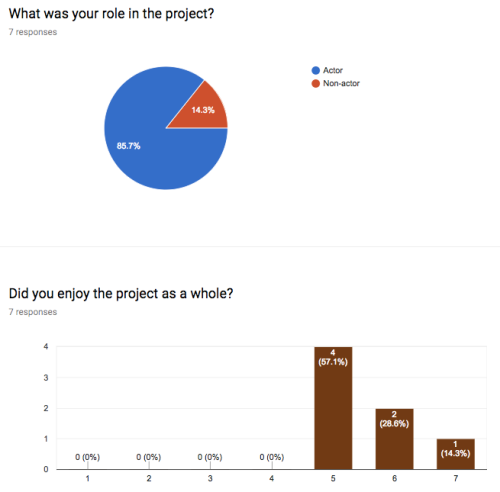
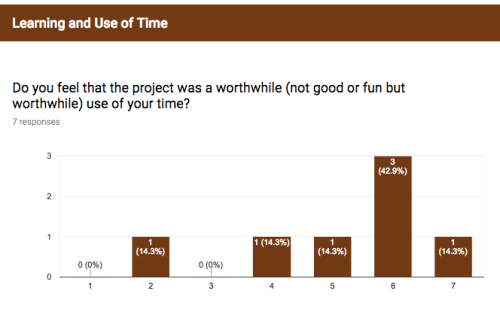
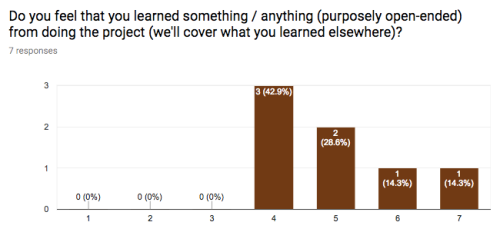
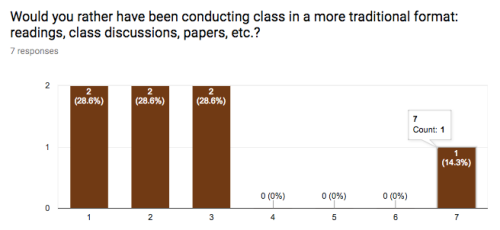
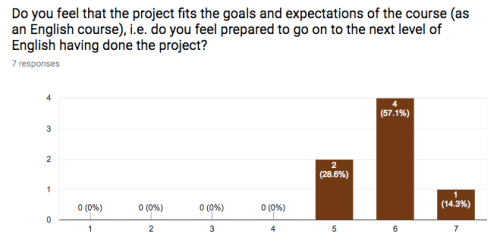
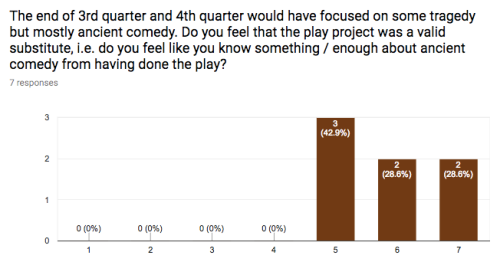
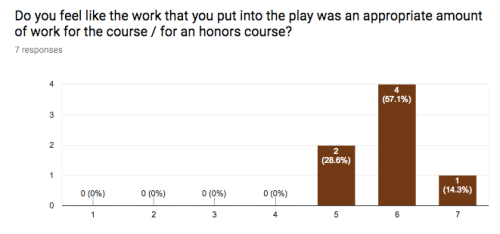
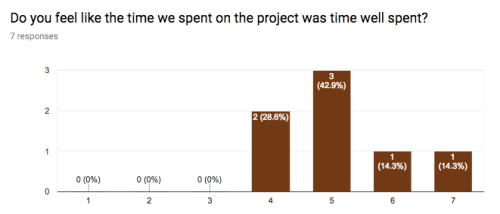
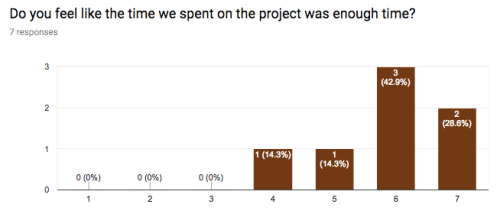
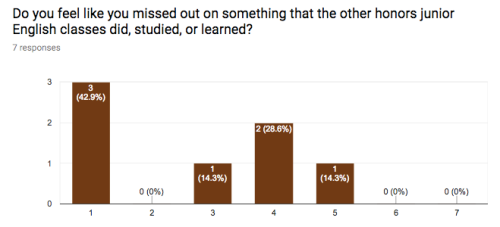
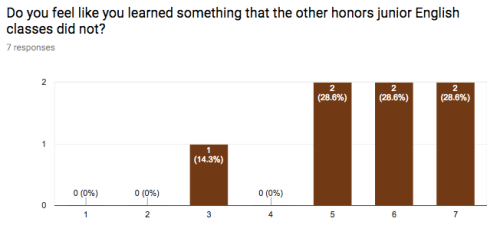
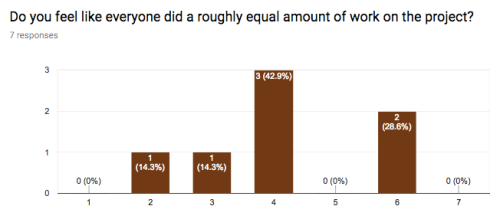
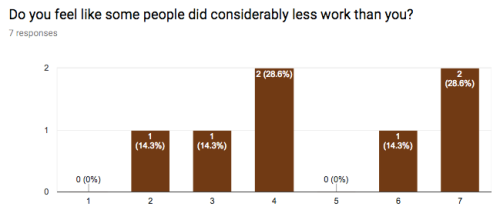
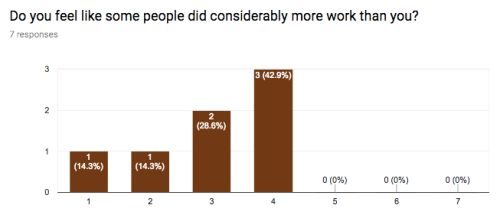
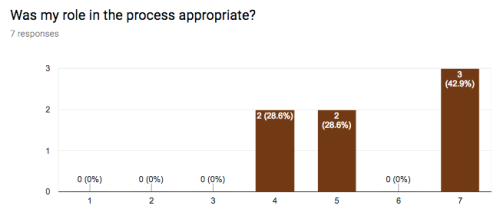
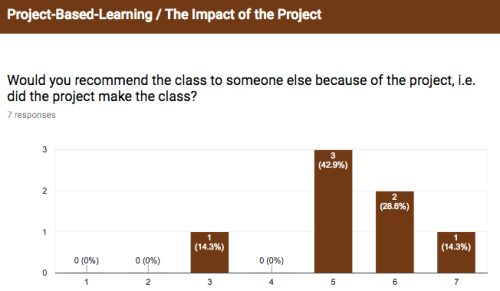
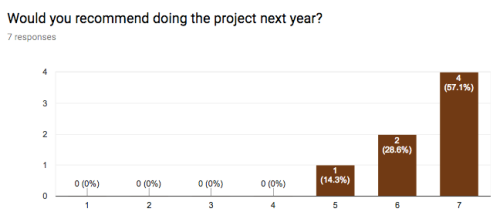
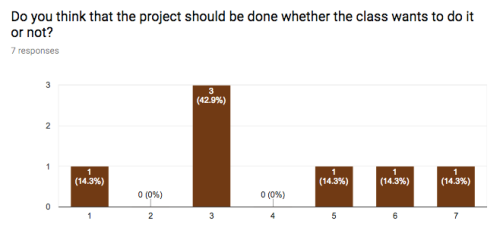
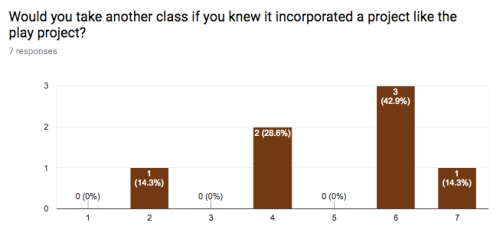
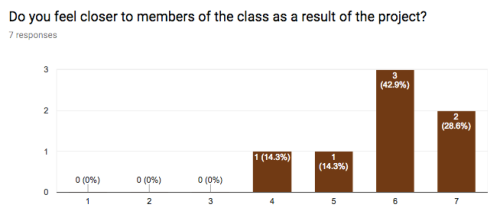
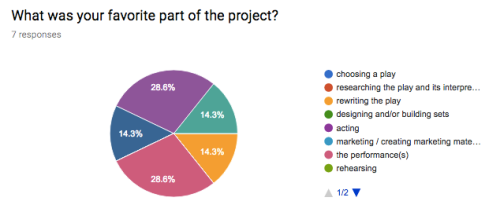
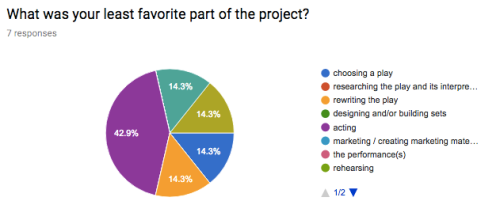
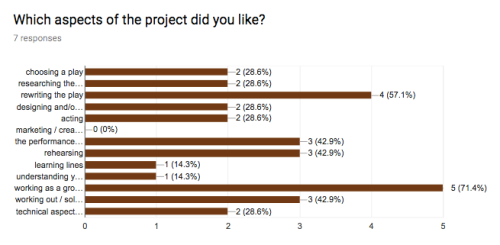
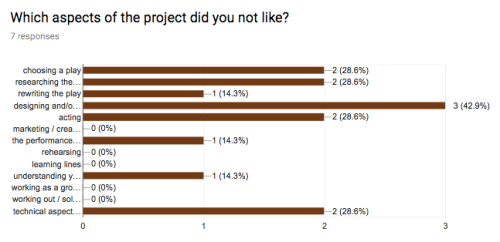
PBL – Classical Lit Play Project 2017 – Claypit Performance
June 19, 2017
Assessment, Engagement, PBL Leave a comment
This was our most difficult, but in many ways most successful, performance. It was last Thursday, so basically the last day of classes (not worth it to explain the ‘basically’) so the energy was pretty low. Because of scheduling vagaries at Claypit we were in a tech classroom, and the students were nervous about being able to perform in an admittedly small(er) space.
But in the end they did a great job. The space worked fine and we even had a better speaker / sound set up because there was one in the tech classroom.
So here it is. Enjoy.
PBL – Classical Lit Play Project 2017 – Loker Performance
June 8, 2017
Assessment, Engagement, PBL Leave a comment
We performed at Loker today. My students enjoyed having a theater; they incorporated the lights, both stage and house (to the delight / chagrin of the 4th graders?) and again did a nice job. And the Q & A, as usual, was excellent; the 4th graders had some great questions. I’ve included the performance is below.
PBL – Classical Lit Play Project – Happy Hollow Performance
June 5, 2017
Assessment, Engagement, PBL 1 Comment
Friday was performance day / debut day for this year’s Classical Lit play. I had started this project last year with an adaptation of Plautus’ Menaechmi that we performed for a high school audience and a parent audience; you can see write ups of last year’s play here . This year the class decided to similarly adapt a Classical text but to perform for elementary students. Friday, we went to Happy Hollow Elementary School and performed for fifth and third graders, maybe 50 to 70 students?
Perhaps the most interesting, and pleasantly surprising part, was the Q & A afterwards, which the principal suggested. We went for maybe 15 mins with questions from the students, all of which my students answered and answered well. I’ve included below a picture gallery from the play and below that the video of the play. I’ll include the student surveys and debriefing info in later posts.

